Natural Sciences
Make Mathematics speak to the public & link it to economic growth, Minister Musenero appeals to Mathematicians
Published
3 years agoon
By
Mak Editor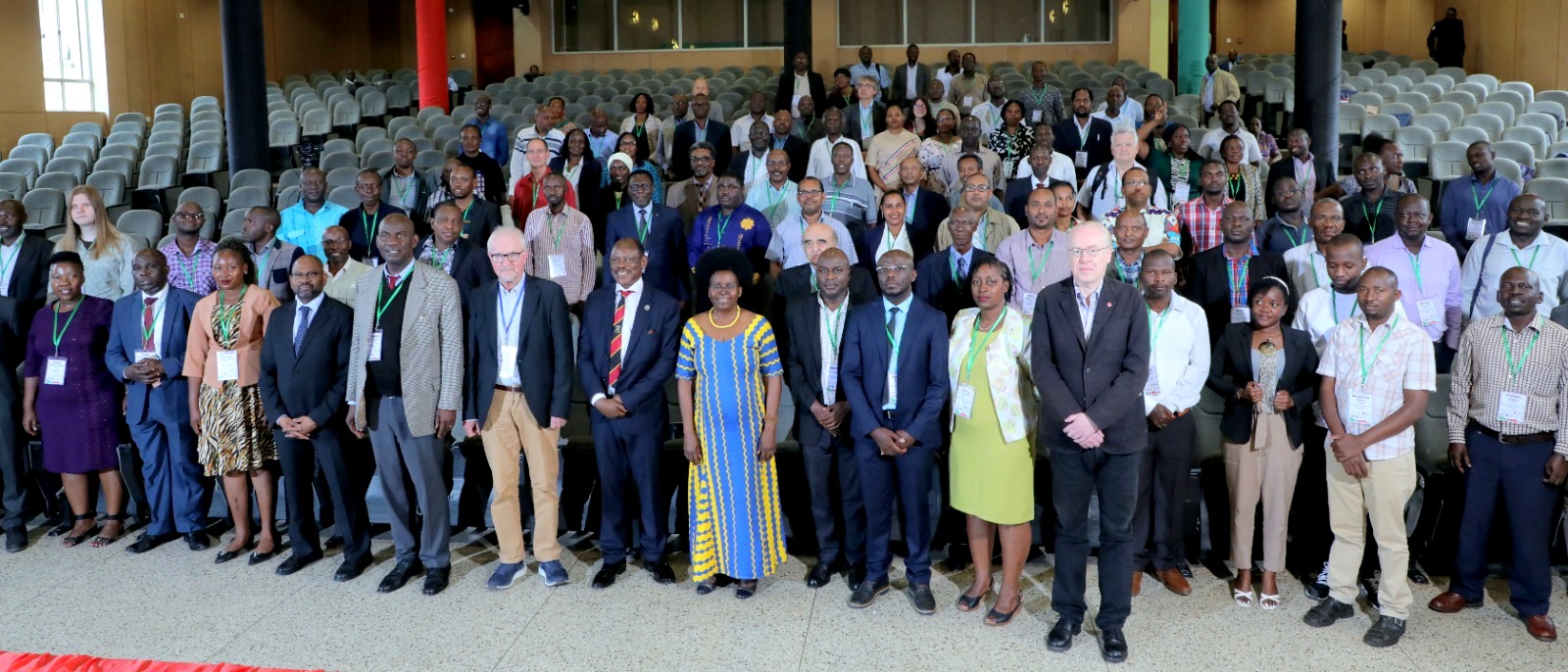
By Ritah Namisango
The Minister for Science, Technology and Innovations, Hon. Dr. Monica Musenero called upon mathematicians to ensure that mathematics speaks to the public in a language they could understand and use for economic development. This was during the opening of the four-day joint African-Nordic Mathematics conference that was held at Makerere University under the theme, “Celebrating 20 Years with ISP/EAUMP/SIDA, 10 Years with CIMO/HEI-ICI and Commencing the NORHED II-Funded Mathematics for Sustainable Development Project from 1st to 4th August, 2023.
The Conference brings on board over 150 mathematicians from 15 countries including Kenya, Tanzania, Rwanda, Zambia, Namibia, Ethiopia, Botswana, South Africa, Australia, Norway, Hungary, Denmark, Germany, USA and Uganda the host.
The conference is aimed at stimulating regional and international collaboration in training, research and outreach; honouring Professor Leif Abrahamsson for his great contribution to the development of mathematics in the East African region and beyond; celebrating the new Mathematics initiative MATH4SD in the region under NORHED-II as well as providing a forum for interaction among mathematicians from Africa and beyond with a view of sharing experiences in mathematical training, research and outreach activities.
Officially opening the Conference, Hon. Monica Musenero, an alumna of Makerere University informed the mathematicians that linking mathematics with science, technology and innovation is a key driver to economic development. So, when people are isolated and separated from such an important subject, leaving it in an academic corner, we miss 50% of the development. She appealed to the mathematics researchers to break down their findings to make them relevant to the entire public. She advocated for mathematics publications that can be read, understood and appreciated by the public for economic growth.
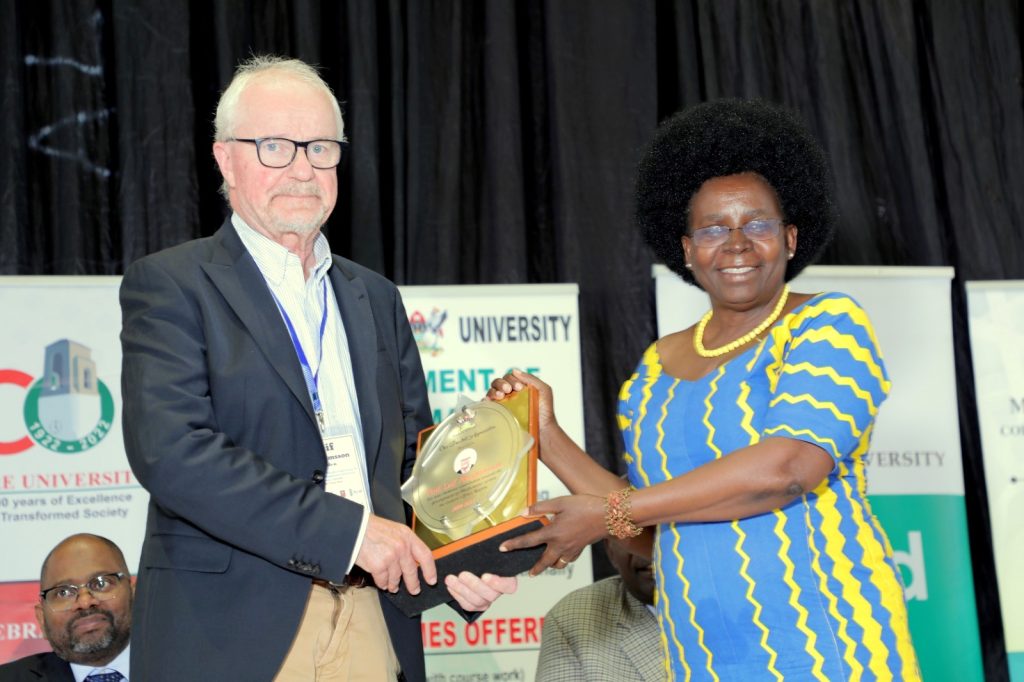
“If we are to have our economy grow, then we are going to come back to the corner of science and start to interpret what it means. We really need to functionalize the definition of mathematics. In simple terms, science is knowledge. I can speak that to a kindergarten pupil and they understand it. I am sure that people here have very specialized knowledge, but it has to be translated into technology and simply using mathematics to develop tools. I am sure there are very many tools that have been developed. However, for the public, we find it difficult to see those tools. So, we need to understand them such that they can speak and make sense to us,” Hon. Musenero said.
The Minister said that the academia struggle to find funds partly because some of the people who would provide those funds are not able to translate the mathematics language. She stated that if they could focus on translating the mathematics to make it visible, then obtaining funds would be quite easy. She thus urged the researchers to use their findings to create knowledge and develop tools to find solutions to people’s problems, where they live, work and spend their day to day lives.
“I would like to bring this from our side by saying that, please let mathematics speak to us. Make the PhDs speak to us. In science we do research and generate knowledge, but the knowledge must be transformed into tools. For instance, we used calculators in schools, but we never realized the mathematics in those calculators. That is a task that we have to walk this journey to translate the science into enterprises, such that we can bring about our socio-economic transformation.” She remarked.
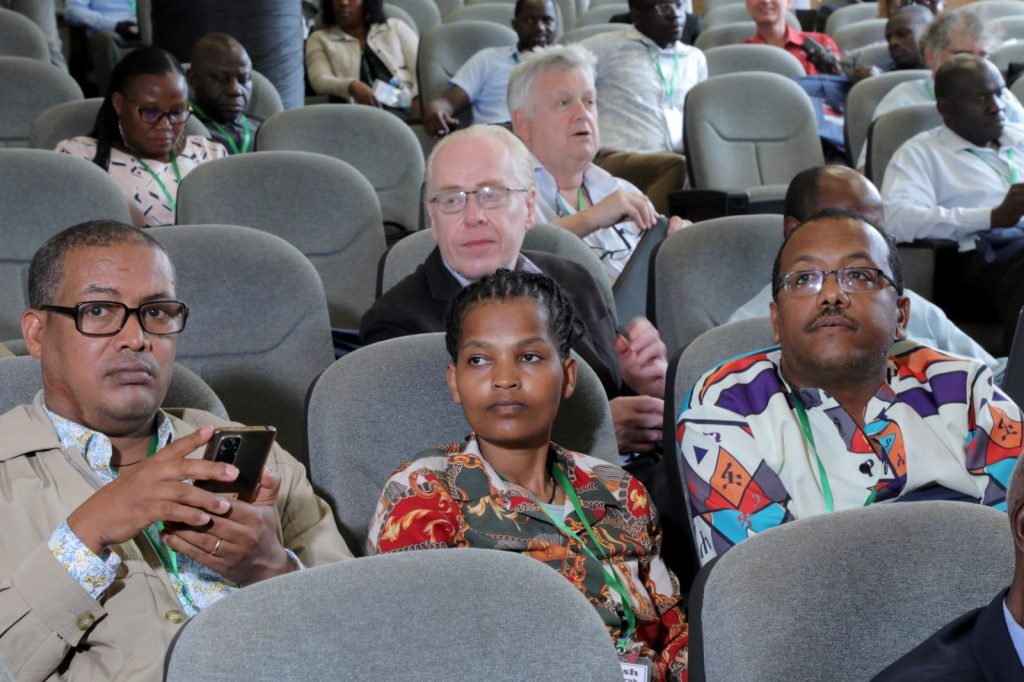
Speaking about transforming Uganda’s economy, Hon. Musenero said that the country is focused on the socio-economic transformation. She stated that Science is no longer just a sector, but an approach to economic development. She highlighted that in order to take science as an approach, we can only do that if we are able to bridge the gap between knowledge and understanding. She emphasized that research is the only avenue for production of high caliber human resources as well as the best input into a country’s human capital. “When the nation is engaged in research, it rapidly increases its human capital and following closely would be the development of the nation and the transition from a commodity based economy to a science led economy.”
On behalf of the Government of Uganda, the Hon. Musenero acknowledged the Nordic governments for the generous support towards the advancement of research and innovations in mathematics in Uganda. She also committed to working with key players to ensure that the investments would be effectively translated to ably formulate well informed policies that will lead to sustainable development as well as development of tools and innovations.
To the mathematics researchers and graduates supported under the NORAD program, the Minister invited them to a dialogue so that they discuss strategies that will benefit the country. “I invite the Masters and PhD graduates, especially those from Uganda for a dialogue to see how to develop our country together and retain you in the country. We badly need you now, but many have in the past exited the country because they have not been seeing where else to go. We also need to find a way on how those who already left the country can come back home to work together.”
The Vice Chancellor, Prof. Barnabas Nawangwe commended the Nordic governments of Sweden, Norway, Finland and Denmark for supporting Makerere University and other regional universities in the areas of human resources capacity building, research, library sciences and information technology and infrastructure development.
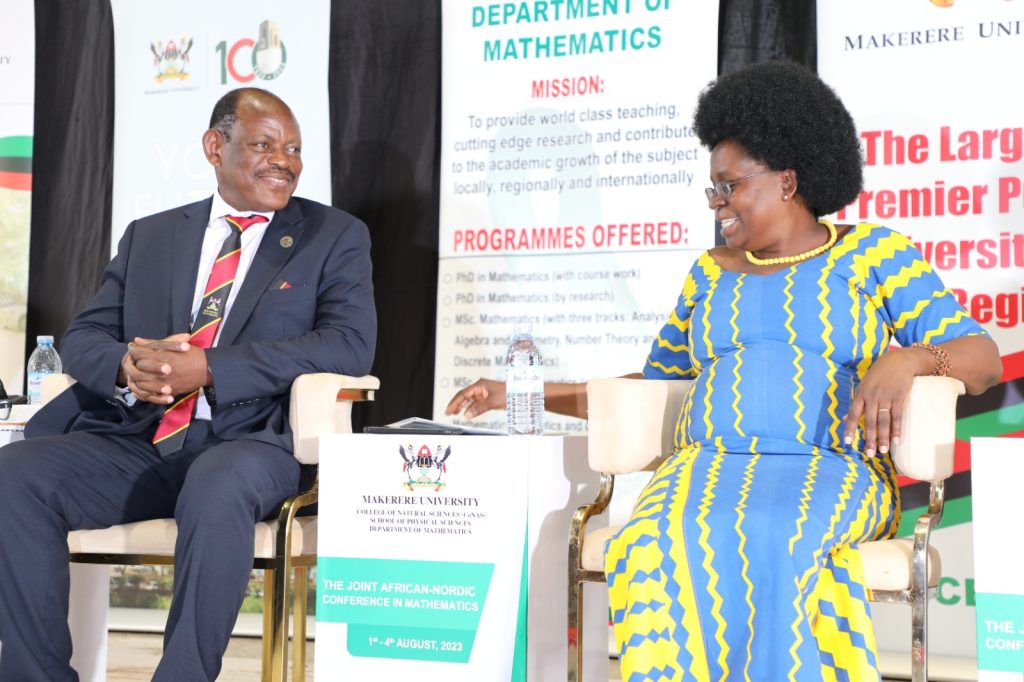
“The Nordic support has greatly played a relevant role in helping Makerere University to deliver our core functions which are teaching, research and innovations and partnerships. Makerere University has benefited significantly from the very strong relationship and support from the Nordic countries. In particular, I must say that Sida and NORAD have helped us to come out of those difficult years and they have helped us to train more than 600 PhDs over the last 20 years. We are indeed very grateful,” Prof. Nawangwe said.
Prof. Nawangwe called upon staff, individuals and universities from Africa that had received the NORAD and Sida support to use it for capacity development and multiply the benefits of that capacity. He said that if that support is put to good use, it will help Africa to get out of the prevailing circle of poverty.
The Vice Chancellor underscored the value of mathematics. He categorically stated that mathematics is the mother of all sciences, and without it, we could not get anywhere. According to Prof. Nawangwe, the work of mathematicians is the foundation of everything that we want to do in science and developing our countries.
During the opening ceremony, Makerere University recognized Professor Leif Abrahamsson for his valuable and selfless contribution towards the development of mathematics in the East African region and Uganda in particular.
“Today, we are honoring you Professor Leif Abrahamsson for the work you have done. As part of establishing everlasting memories of you in the East African region, Makerere University will establish the Leif Abrahamsson Chair for supporting mathematics in the Region.”
The Vice Chancellor noted that to solicit for funds to support the region in Mathematics, there is need to use the name ‘Leif Abrahamsson’ to permanently get support for Mathematics. He revealed to the participants that through this Chair, the University would target to raise at least USD 500,000 per year to support Mathematics in the East African region.
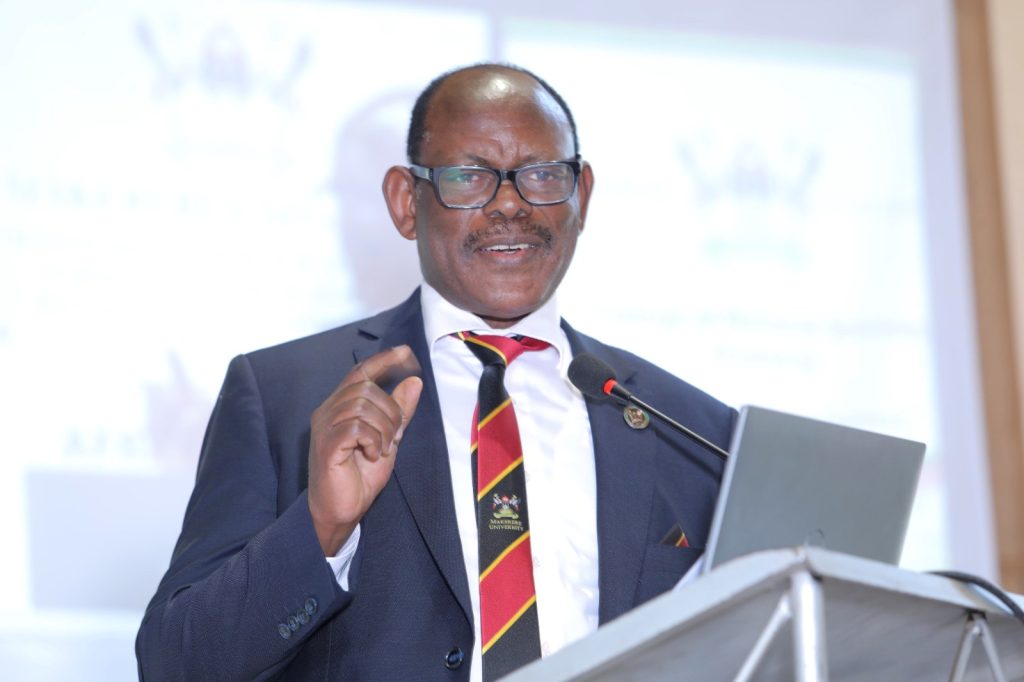
Prof. Bengt-Ove Turreson, the Director-International Science Program (ISP) said that ISP at Uppsala University-Sweden works to strengthen the scientific knowledge, research capacity and postgraduate education in the basic sciences that include mathematics, physics and chemistry in countries where such capacity is non-existing or weak.
As they celebrated 20 years of existence of the Eastern Africa Universities Mathematics Programme (EAUMP), Prof. Bengt-Ove Turreson recalled that in the early stages things quite difficult, but became better in 2002 when EAUMP was established. The network which started with three (3) countries namely Uganda, Kenya and Tanzania, was later extended to Rwanda and Zambia, and it has played an important role in building human capacity. In the recent years, ISP started supporting PhD programs in the region. They started with supporting four (4) research groups.
“What we are doing in terms of global research is very unique. There is no other country that does this kind of work. All the countries are proud of the work we have been doing. We started working in 1961. We provide long-term funding, coordination and mentoring to research groups and regional scientific networks at universities and research institutes in low and lower-middle income countries in Africa, Asia and Latin America. Our main funding comes from the Swedish Government through the Swedish Development Cooperation Agency (Sida),” said the Director.
Prof. Turreson remarked that in addition to seminars such as the ongoing mathematics conference at Makerere University, EAUMP would establish summer schools to bring on board young mathematicians from the different parts of the world to enhance the new modern mathematics.
The Inter-University Council for East Africa (IUCEA) disclosed that mathematics is proven to be indispensable to human development and economic growth since the time of the industrial revolution.
“The third revolution brought about by the advance in communication and information technology finds its origin from applied mathematics and physics to a larger extent. We are now in the fourth industrial revolution which has been brought largely by data and artificial intelligence, which too find their roots from different parts of mathematics such as probability and statistics. The initiatives that involve AI or data science are driven by mathematics. Therefore, for the region to catch up with technological advances, it should prioritize mathematics, education and research,” said Prof Rai, Deputy Executive Secretary-IUCEA who represented the Executive Secretary- Prof. Gaspard Banyankimbona.
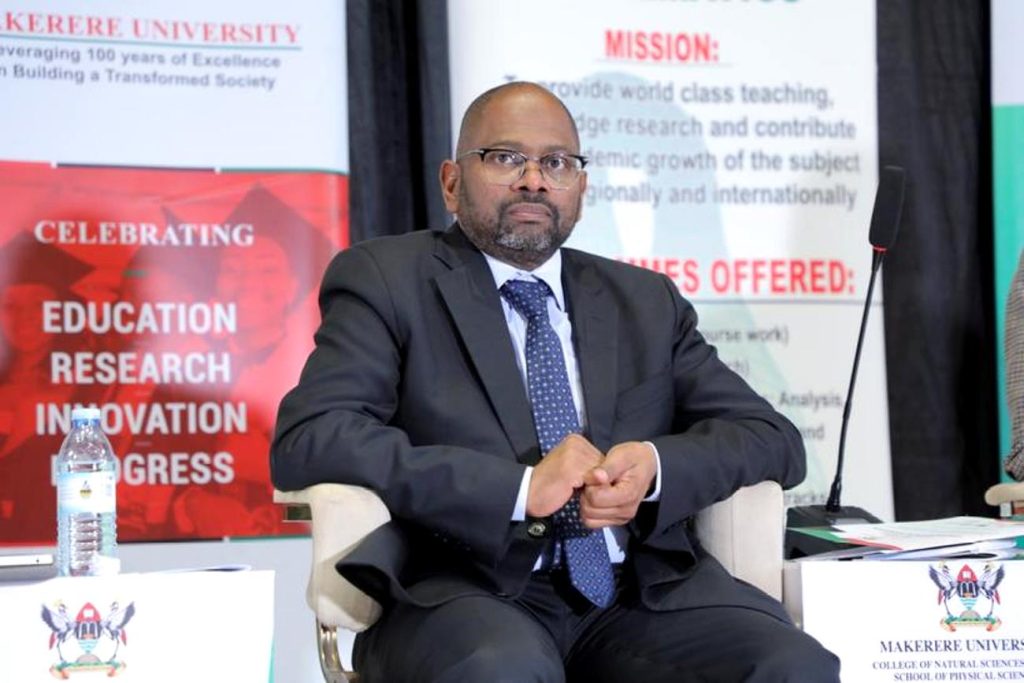
Prof. Idris Rai assured participants that the interactions, engagements and networking of researchers will bring out more collaborative research activities to the region in addition to expanding knowledge in research and mathematics.
Counting the gains, Prof. Stephen Luketero, the overall coordinator of the Eastern Africa Universities Mathematics Programme (EAUMP) that was established in 2002, to alleviate the dismal state of Mathematics in Eastern Africa noted that with support and funding from Sida and NORHED, the region has been enriched with numerous developments in terms of knowledge. He stated that a substantial number of PhDs has been produced across the region in excess of 50 PhDs and countless number of masters. He also noticed that as a result, the number of females enrolling for PhDs in Mathematics was tremendously increasing.
“We have been able to have quite a big number of students in pursuit of the doctorates and post doctorates over a time. The research groups have been formed and out of such research collaborations, it is quite easy for the teams to come together and participate in writing research grants that can enhance research within the region. There was a wing that was created to cater for the advancement of knowledge and progression of female students and this has also run very well. Quite a number of graduates we are producing have been able to bridge the gap between male and female mathematicians.” Prof. Luketero said.
Speaking about Sida, ISP, NORAD support, CIMO and the achievements and future of EAUMP/NORHED, Prof. John Magero Mango the EAUMP Internetwork Coordinator said that with support under the NORDIC program, they have trained 11 PhDs in mathematics of which 5 are from Makerere University and 6 from University of Dar es Salaam. In addition, he stated that over 100 Masters have been supported with over 100 publications.
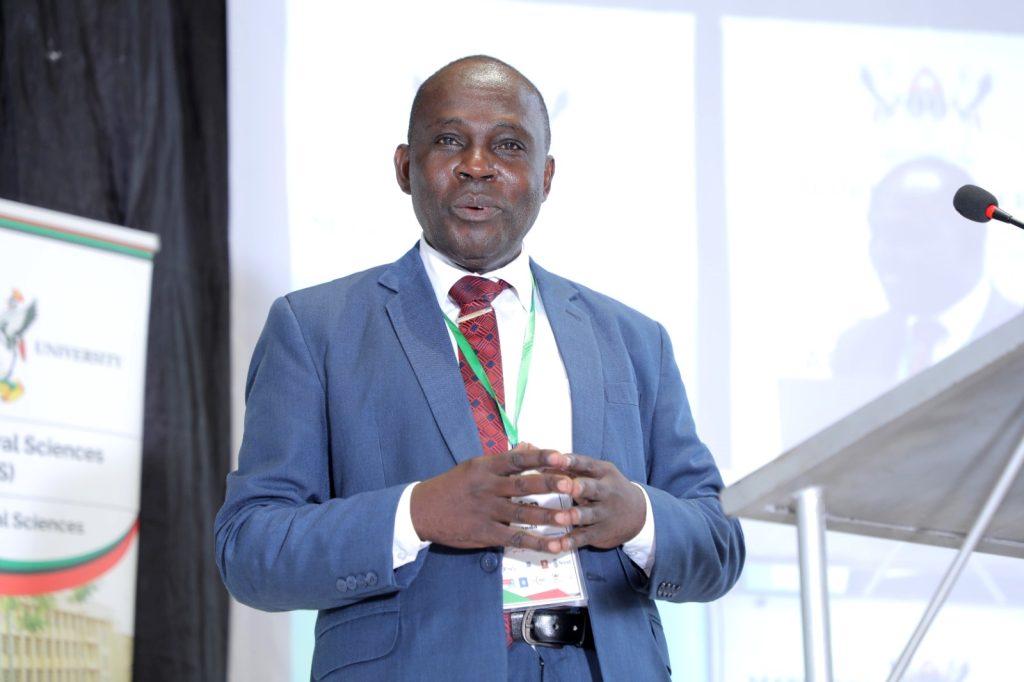
“The NORAD fund at Makerere University from 2021 to 2026 is supporting five (5) PhDs. We evaluated our progress and as we review the curriculum which we formed under Sida, we are also concentrating on the outreach programs for Data Computation skills via mathematics. Those are key innovations that are worth recognizing at this moment under the support of our NORDIC friends. Under CIMO, we have greatly benefitted in extending our knowledge to the local industries.” Prof. Mango said.
The Principal, College of Natural Sciences at Makerere University, Prof. Winston T. Ireeta mentioned that organizing such a conference that brings on board 15 countries was a great achievement for the College, the Mathematics Department and Makerere University at large.
He said, “This gives us credibility and great visibility as Makerere University. We also have some goals we have set up to achieve some of which are through collaborations and interacting with others. Let us work on achieving them. Collaborations and networking are very important.”
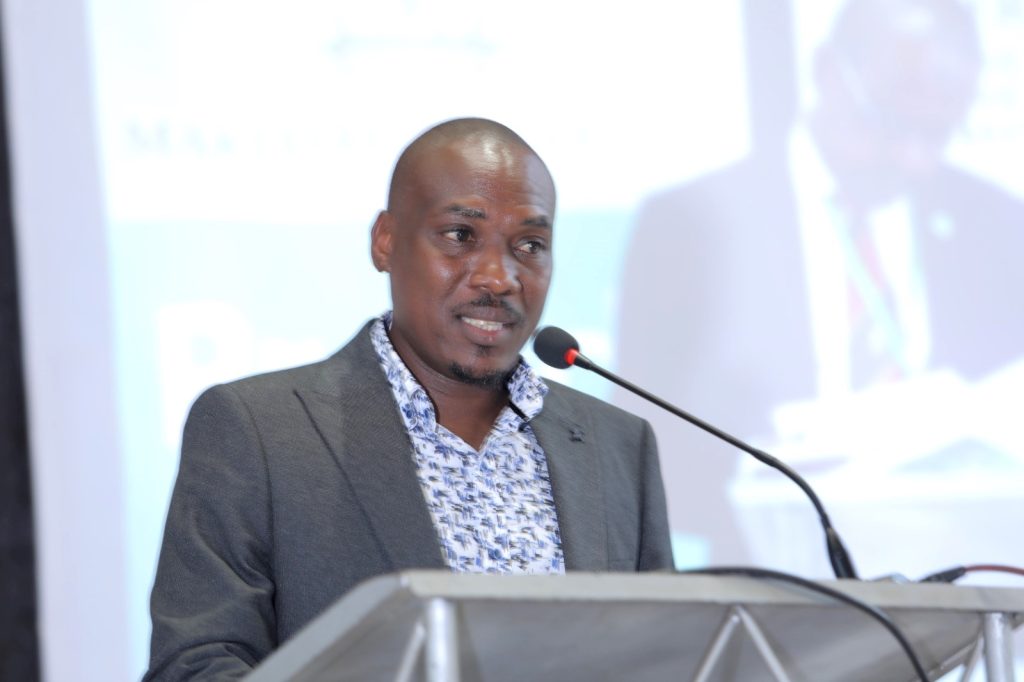
He applauded the Local Organizing Committee chaired by Dr. Godwin Kakuba and the professors who have greatly helped during examinations and PhD defenses. He also thanked the funders of the mathematics projects, ISP and Nordic governments for the support they have rendered in the promotion of mathematics.
Taking stock of the collaborations with major universities in Kenya, Tanzania, Rwanda, Zambia, Ethiopia, Finland, Norway and many other universities in the region, Dr. Godwin Kakuba, the Head of the Department of Mathematics at Makerere University said hosting the conference provided a platform to celebrate the collaborations that had enabled the department to grow to such strength.
“As the head of department, I am very proud of these achievements and very optimistic about the future with profound joy. When we look back to so many years ago, about 20 years, the number of PhDs was minimum, but now, having a PhD has become normal. The department of mathematics is therefore ready to take that direction towards transforming Makerere University into a research-led institution,” he remarked.
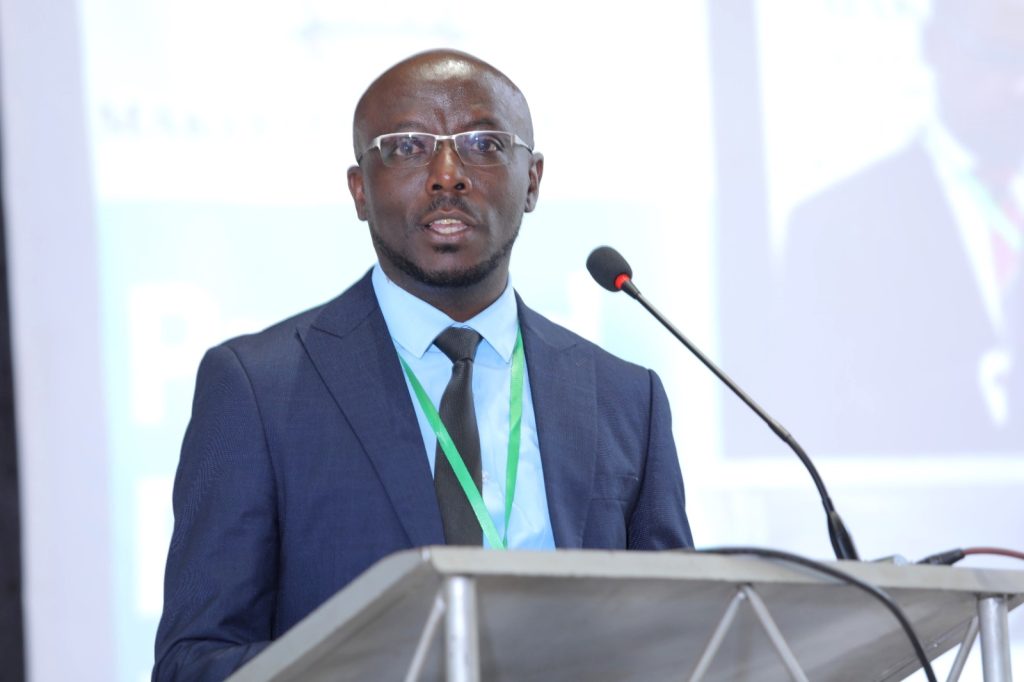
Dr. Kakuba added that they will always measure their strengths annually basing on the number of publications made, the number of graduate students trained, number of research workshops and conferences organized and hosted as well as the goals achieved each year.
During the four day conference, research papers and poster presentations focused on the following areas: Algebra, Graph Theory, Real and Complex Analysis, Topology and Geometry, Dynamical Systems, Experimental Pure Mathematics, Biomathematics, Data Science, Biostatistics, ODES and PDES, Financial/Insurance Mathematics, Numerical Analysis, Fluid Dynamics, Operations Research, Stochastics, Applied Probability and Mathematical Statistics, Mathematics Education, Optimization, Bioinformatics, Clifford and Hypercomplex analysis as well as Combinatorics.
You may like
-
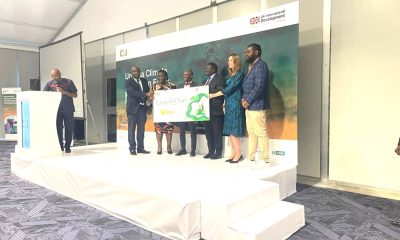

Makerere University Researchers Awarded UCIF Grant to Tackle Maize Contamination with Innovative Plant-Based Fungicide
-


Makerere Graduation Underscores Investment in Africa’s Public Health Capacity
-


Makerere’s 76th Graduation Ceremony: CHS showcases research strength with 26 PhD Graduates
-


Mak 76th Graduation Ceremony: CoNAS Presents 16 PhDs & Best Performing Male Student in the Sciences
-


Medical graduates urged to uphold Ethical values
-


76th Graduation Highlights
Natural Sciences
Makerere University Researchers Awarded UCIF Grant to Tackle Maize Contamination with Innovative Plant-Based Fungicide
Published
1 day agoon
March 4, 2026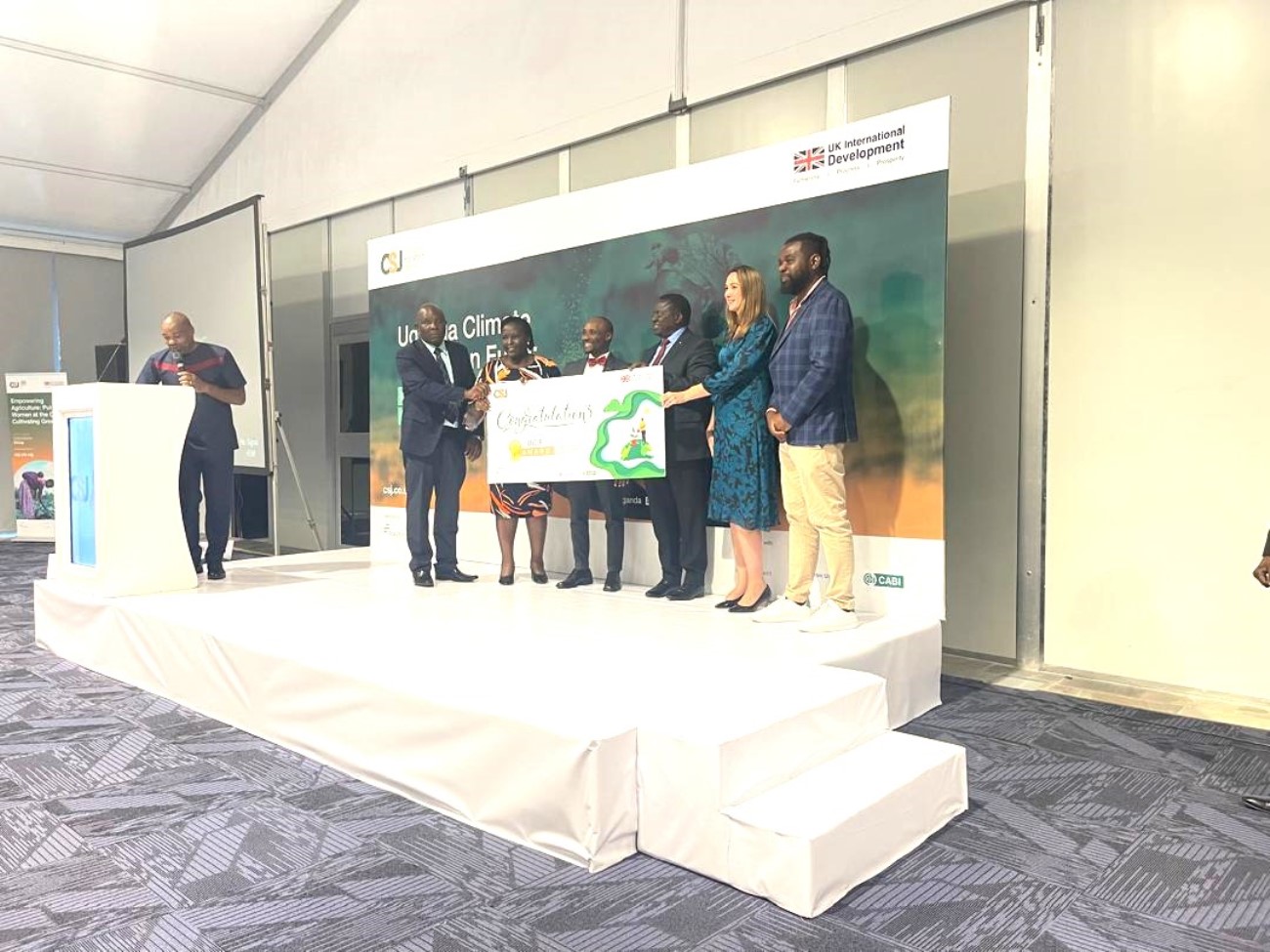
In a significant stride towards ensuring food safety and agricultural resilience, a team of researchers from Makerere University has been awarded the prestigious Uganda Climate Innovation Fund (UCIF) to support the development of a groundbreaking solution to maize contamination.
Maize, a staple food for millions of Ugandans, has long been threatened by Aspergillus fungi, which produce aflatoxins, highly toxic compounds that pose serious risks to human health, livestock, and the nation’s agricultural productivity. Recognizing the urgency of this challenge, the research team from the Department of Plant Sciences, Microbiology, and Biotechnology at the College of Natural Sciences (CoNAS), Makerere University, is pioneering the development of a plant-based organic fungicide aimed at significantly reducing Aspergillus growth and aflatoxin contamination in maize.
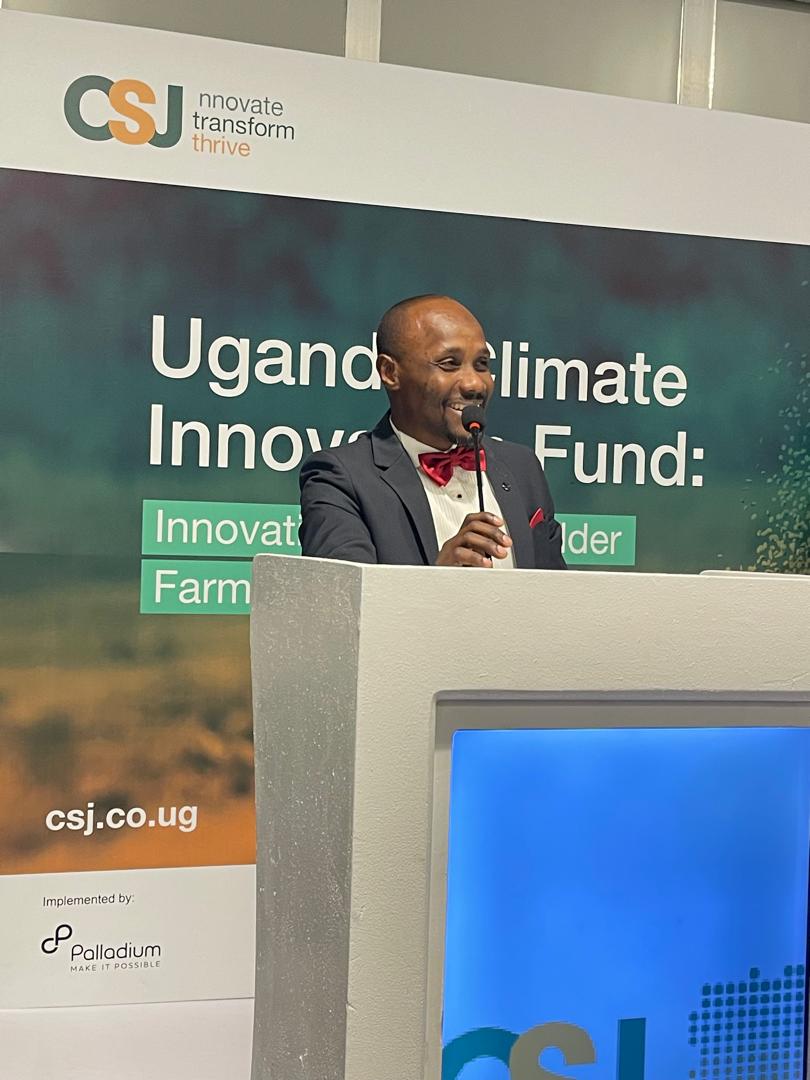
The initiative is spearheaded by Dr. Abubakar Sadik Mustafa (Principal Investigator), with major contributions from co-innovators Dr. Jamilu E. Ssenku, Dr. Patience Tugume, Mr. Frank Kalungi, and Mr. John Okello. The team officially received the UCIF award on 26 February 2026 at an event held at Kampala Serena Hotel.
“This recognition underscores the importance of locally-driven scientific innovation in safeguarding our food systems,” said Dr. Mustafa upon receiving the award. “Our goal is to deliver an environmentally friendly solution that not only protects maize but also contributes to public health and supports sustainable livelihoods for smallholder farmers.”
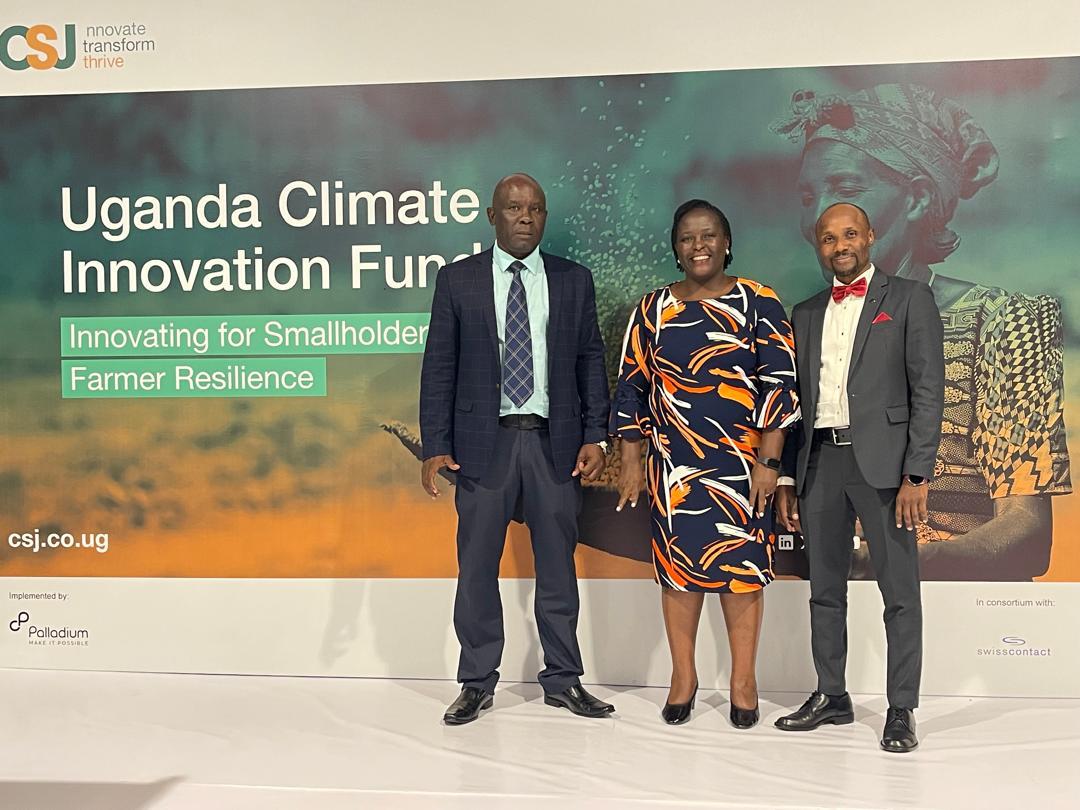
The UCIF grant, funded by the UK Foreign, Commonwealth & Development Office (FCDO) under the Climate Smart Jobs initiative, is implemented by Palladium in collaboration with Stanbic Bank, Swissconnect, and CABI. The programme seeks to advance solutions that address the dual challenges of climate change and economic development by supporting innovations that foster sustainable agricultural practices, reduce environmental risks, and create climate-smart employment opportunities.
This breakthrough aligns closely with the global Sustainable Development Goals (SDGs), particularly those targeting good health and well-being (SDG 3), zero hunger (SDG 2), and climate action (SDG 13). By developing a natural, plant-based fungicide, the Makerere University team hopes to offer a scalable solution that mitigates food contamination risks while promoting environmentally sustainable farming practices across Uganda.
Natural Sciences
Mak 76th Graduation Ceremony: CoNAS Presents 16 PhDs & Best Performing Male Student in the Sciences
Published
1 week agoon
February 25, 2026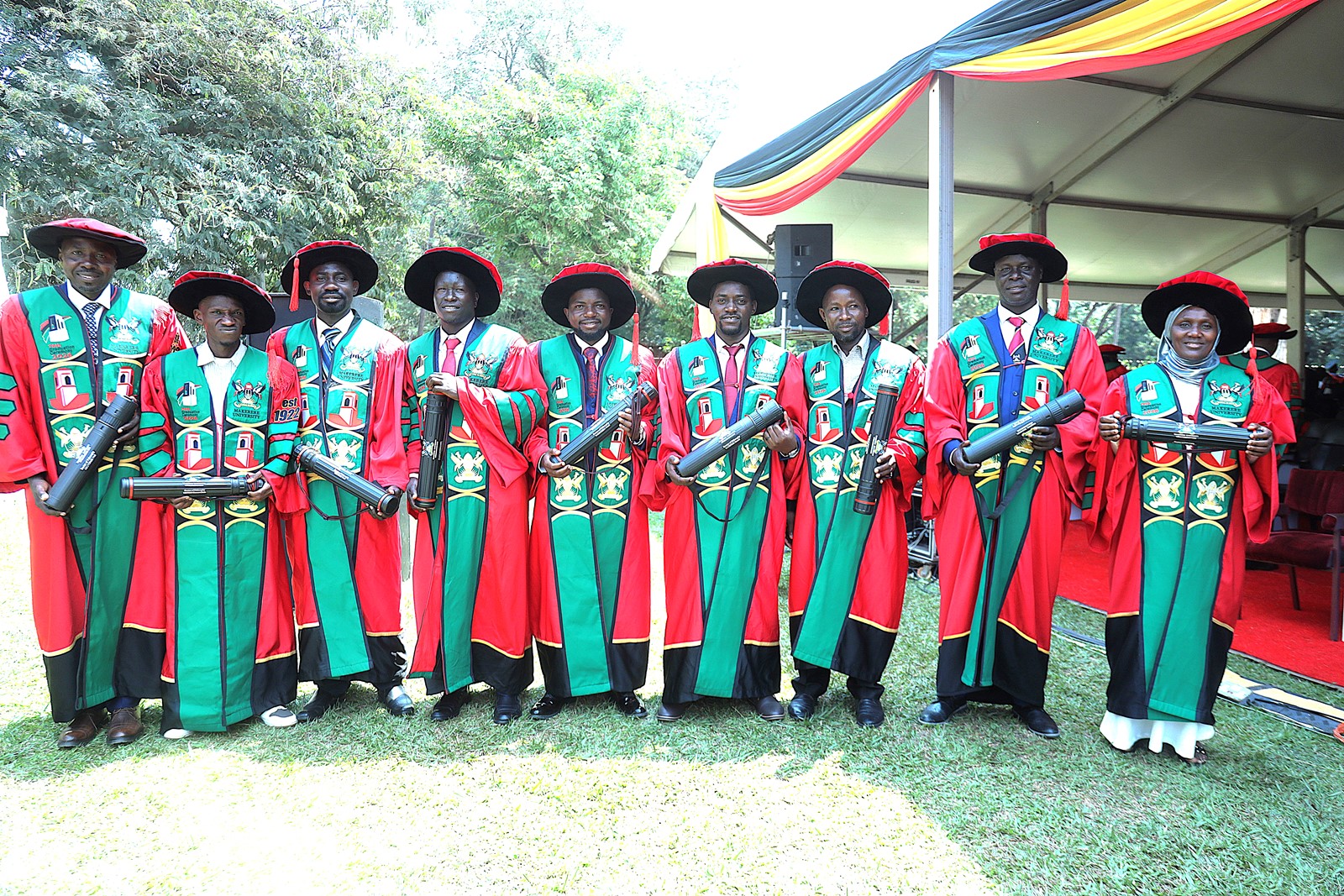
The College of Natural Sciences (CoNAS) presented 269 students for the award of degrees of Makerere University at the 76th graduation ceremony. Of these, 16 graduated with PhDs (4 female and 12 male), 83 with Masters (27 female and 56 male), and 170 with Bachelor’s degrees (45 female and 125 male). The College also presented the Best Performing male student in the sciences. Simon Mungudit graduated with a CGPA of 4.76 in the Bachelor of Science in Petroleum Geoscience and Production. The PhD graduates included; AfazalI Zabibu, a Lecturer at the College of Business and Management Sciences (CoBAMS); Akuyenze Paul, Kawuma Carol, Mutiso Duncan Chalo, Nabiyonga Lydia, and Osinde Cyprian (Plant Sciences, Microbiology and Biotechnology); Batte Hebert, Katende Ronald, and Namugera Frank (Mathematics), Chaciga Jimmy, Tusiime Swaleh, and Komaketch Ignatius (Physics), Kinyua Mbuci, Sekandi Peter, and Shehu Zaccheus (Chemistry), and Nakiyende Herbert (Zoology, Entomology, and Fisheries Sciences).
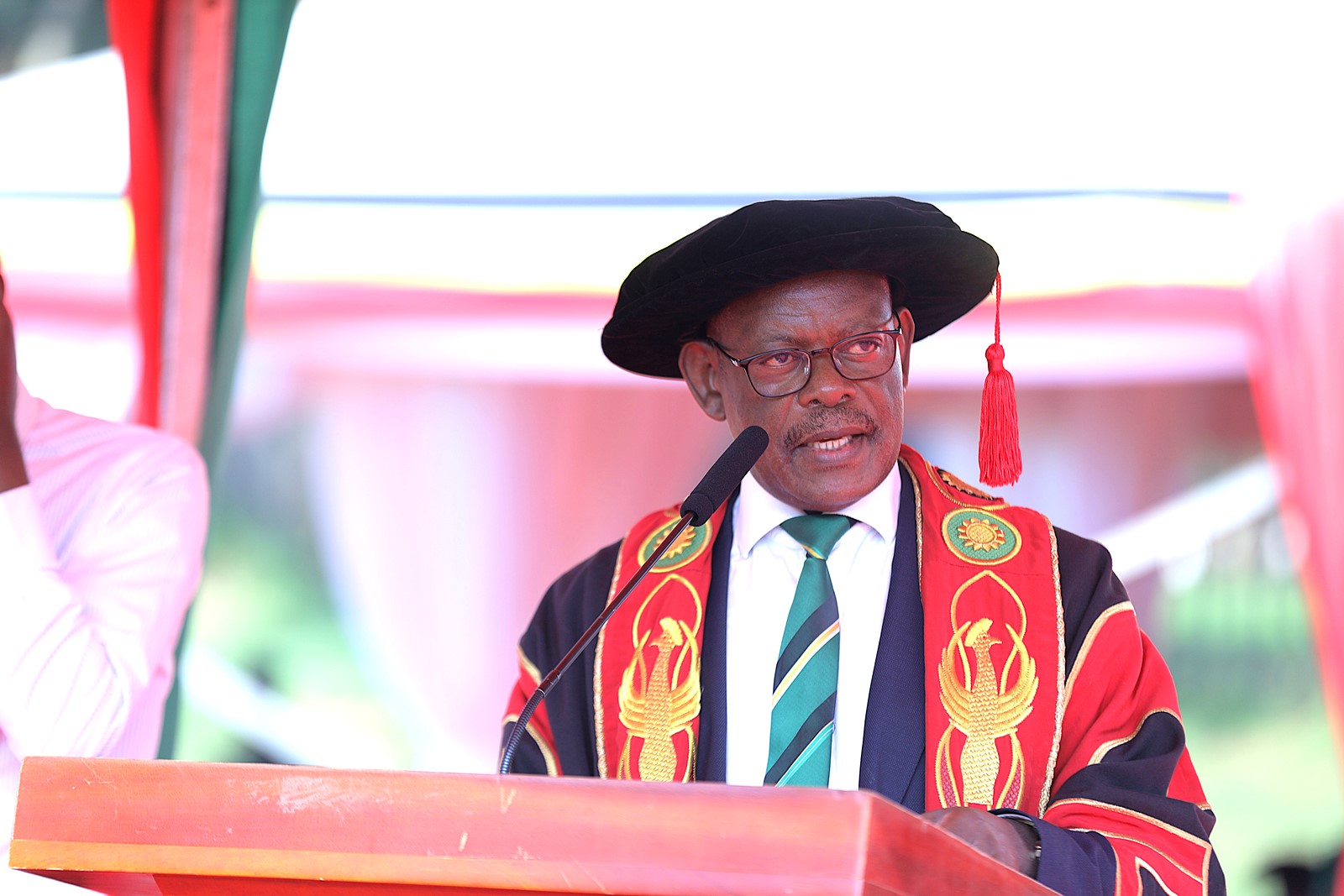
On the second day of the four-day graduation ceremony, which began on 24th February 2026, three colleges presented students for the award of degrees and diplomas of Makerere University. These included CoNAS, the College of Health Sciences (CHS), and the College of Veterinary Medicine, Animal Resources and Biosecurity (COVAB).
Overall graduation Statistics
During the course of the 76th graduation ceremony, a total of 9,295 students will graduate with degrees and diplomas of Makerere University. Of these, 4,262 (46%) are female and 5,033 (54%) are male. A total of 213 students will graduate with PhDs, the highest number in the history of the University. 2,503 will graduate with Masters degrees; 6,343 with Bachelor’s degrees; 206 with postgraduate diplomas, and 30 with Diplomas.
Postgraduates constituted 31.4% of the total number of graduands.
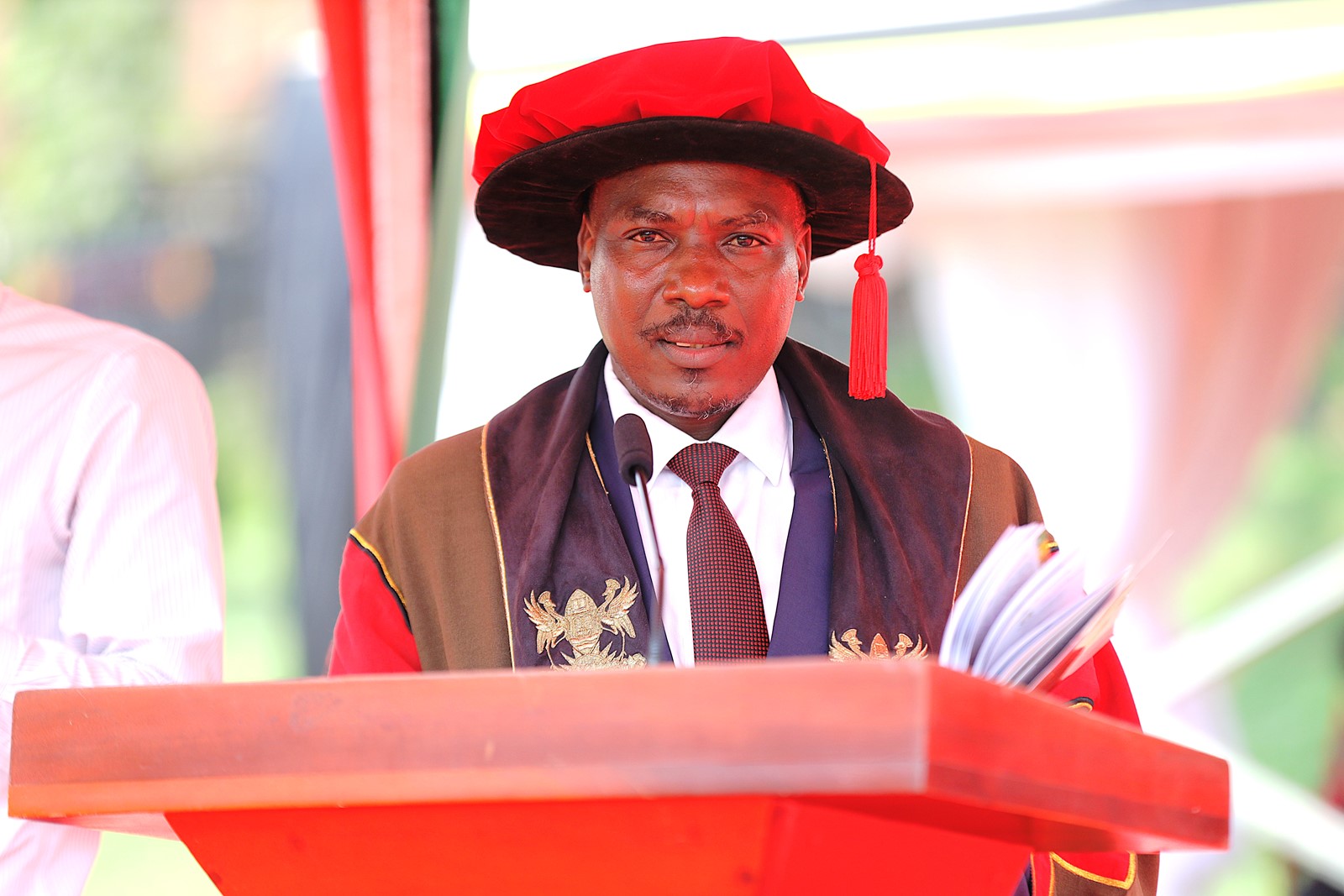
Vice Chancellor’s Remarks
In his remarks, Vice Chancellor Prof. Barnabas Nawangwe commended CoNAS for its transformative research initiatives that are positively impacting communities, highlighting the NutriFishPlus Project, INNOECOFOOD Project, and a project to conserve medicinal plants in Eastern Uganda. Funded by the International Development Research Centre (IDRC) and Australian Centre for International Agricultural Research (ACIAR) under the Cultivate Africa’s Future Fund Phase II, the NutriFishPlus seeks to scale up fish processing technologies and empower fishing communities in Uganda.
The EU-funded INNOECOFOOD Project is transforming food production in Uganda. Through eco-innovative, climate-smart systems, the project aims to improve nutrition, protect the environment, and create jobs- especially for youth and women. Central to this effort are solar- and wind-powered ECOHUBs. These innovative centres use AI and IoT technology to support sustainable fish farming, monitor water quality, reduce losses, and increase yields.
Meanwhile, researchers from the Department of Plant Sciences, Microbiology, and Biotechnology, under the leadership of Dr. Patience Tugume, are spearheading efforts to conserve medicinal plants in Namutumba District. To date, 174 plant species have been documented, with ongoing assessments of threats from unsustainable harvesting. These plants play a vital role in treating malaria, diabetes, hypertension, and certain cancers.
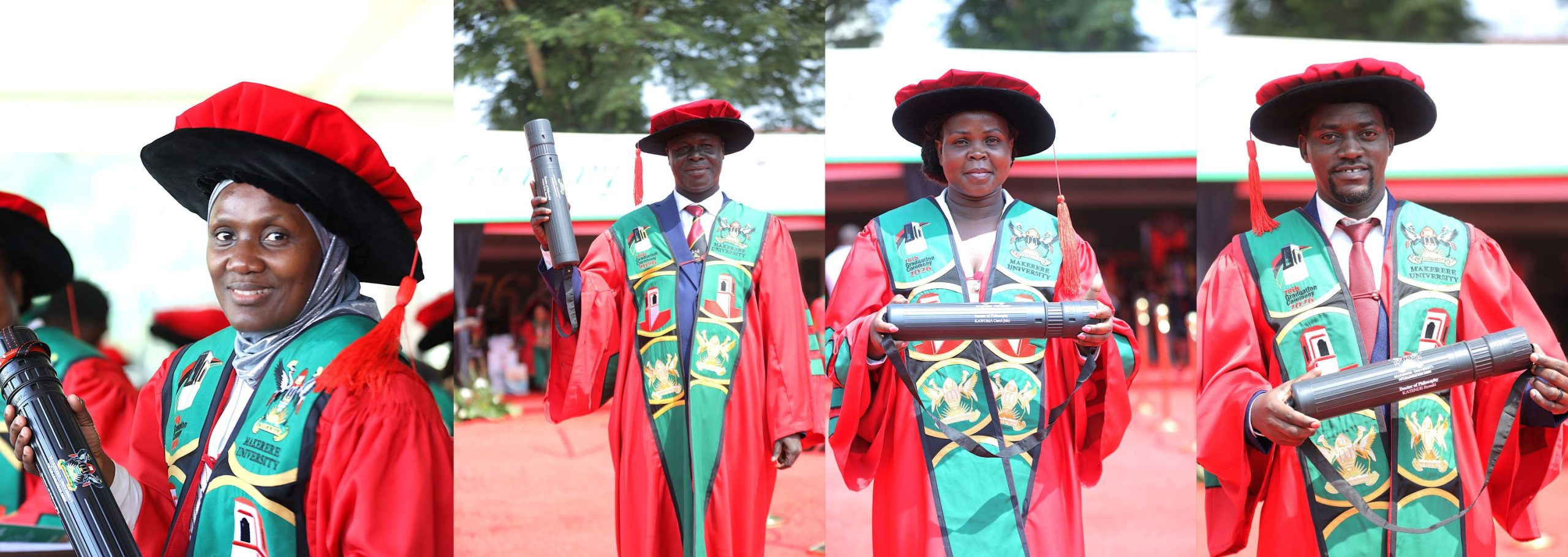
Efforts to Transform Makerere into a Research-led University
In his address, the Vice Chancellor reaffirmed the University Management’s commitment to transforming Makerere into a research-led institution. He expressed gratitude to the Government of Uganda for securing a USD 162 million loan from the Korea Exim Bank to support critical infrastructure development at the University. The funding will facilitate the construction of new facilities for the School of Medicine, School of Dentistry, School of Engineering, the Science and Technology Centre, and the completion of the School of Computing and Information Sciences- an unprecedented development in the University’s history.
The Vice Chancellor further highlighted the pivotal role of the Makerere University Technology and Innovations Centre (MUTIC) in advancing incubation and commercialization. “The Centre offers mentorship, business development training, intellectual property support, and industry linkages to help transform research outputs into viable enterprises.” To date, eleven spin-off companies have been established by students and staff, while the University’s Innovation Pod (UniPod) has incubated more than 100 projects in the past year. The short-term target is to establish 50 spin-off companies annually, with plans to double that number in the long term.
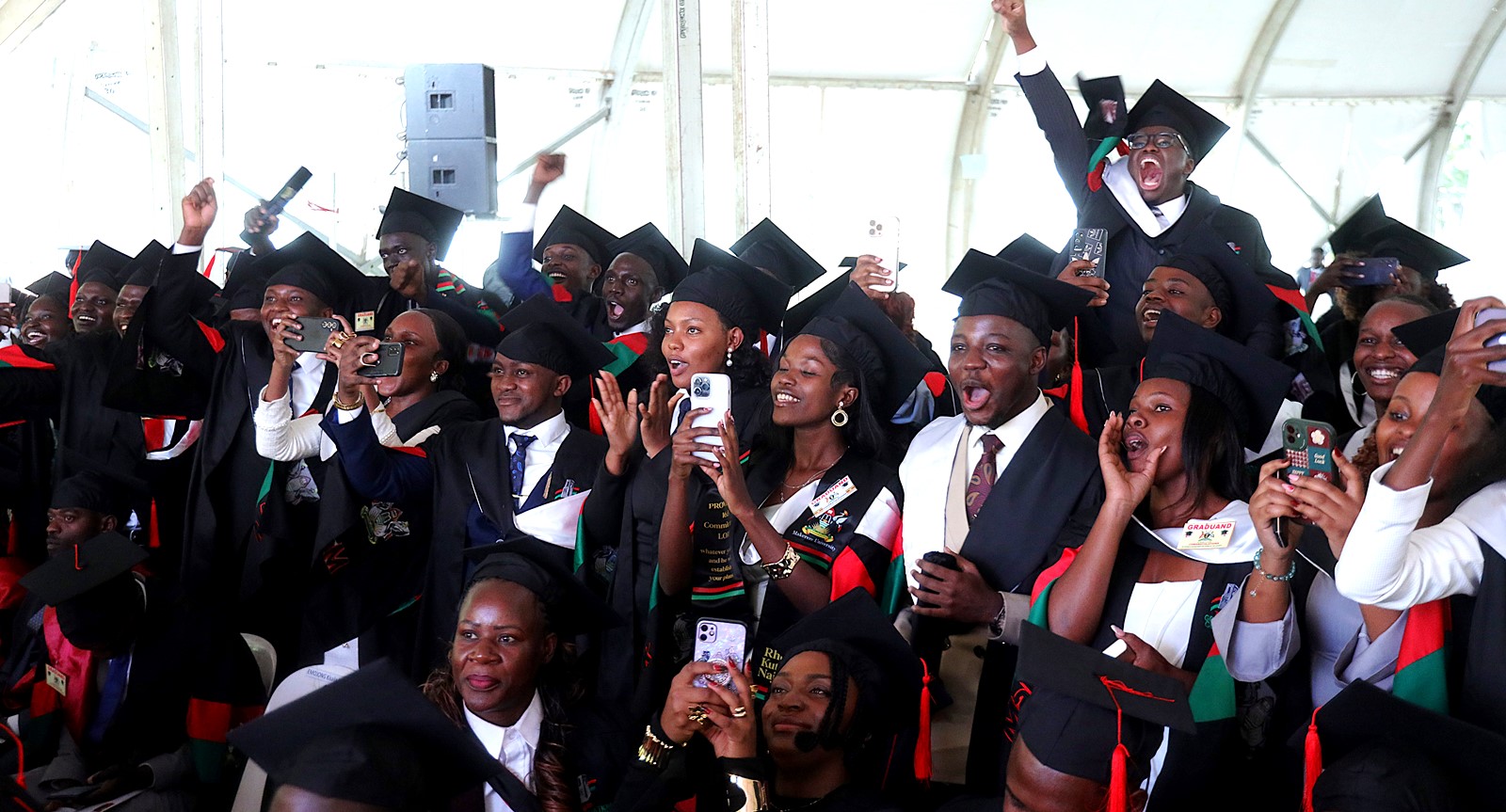
Prof. Nawangwe acknowledged the government’s contribution through the Makerere University Research and Innovations Fund (MakRIF). Through this initiative, the government has supported over 1,400 high-impact research and innovation projects, and facilitated the training of more than 200 PhD students.
In partnership with the Science, Technology and Innovation Secretariat in the Office of the President, the University has also introduced awards to recognize outstanding researchers and innovators. These include the Research Excellence and Innovation Commercialization Awards. “The Innovation Commercialization Award underscores the institution’s commitment to translating research into practical products, services, and technologies that address real-world challenges and support national development,” the Vice Chancellor noted.
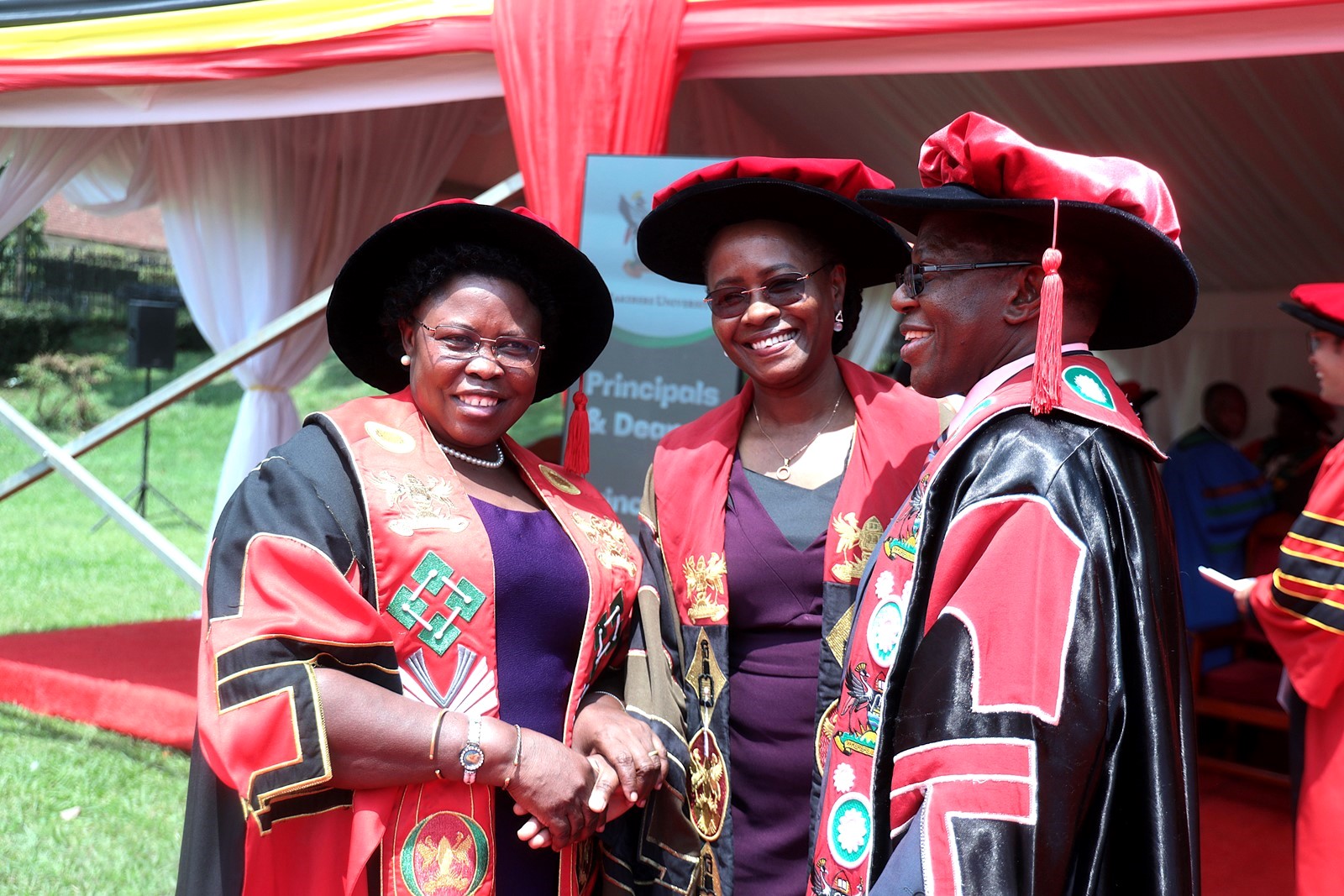
Vice Chancellor’s Message to the graduates and Appreciation to the Partners
The Vice Chancellor urged the graduates to uphold dignity, humility and diligence as they leave the gates of Makerere University, and begin the next chapter of their lives. “As you step out of the gates of Makerere, remain proud of your alma mater and serve as good ambassadors wherever you go. Use the knowledge acquired from one of the world’s leading universities to improve yourselves, your families, communities, country, and humanity at large.”
He equally appreciated the parents and guardians for supporting the students, and the development partners who have extended research funding to the university over the years. These include the Mastercard Foundation, the European Union, NORAD, Sida, IDRC, KOICA, DAAD, NIH, CDC, USAID, the Wellcome Trust, KfW, IUCEA, RUFORUM, ARUA, the PLUS Alliance, WUN, AAUN, AAP, the Madhvani Foundation, and the Government of Uganda through the Higher Education Students Financing Board. “We are equally grateful to the Embassy of China, the Chinese Chamber of Commerce, various Government Ministries, State House, private sector players, and many other partners whose generous support continues to advance our mission.”
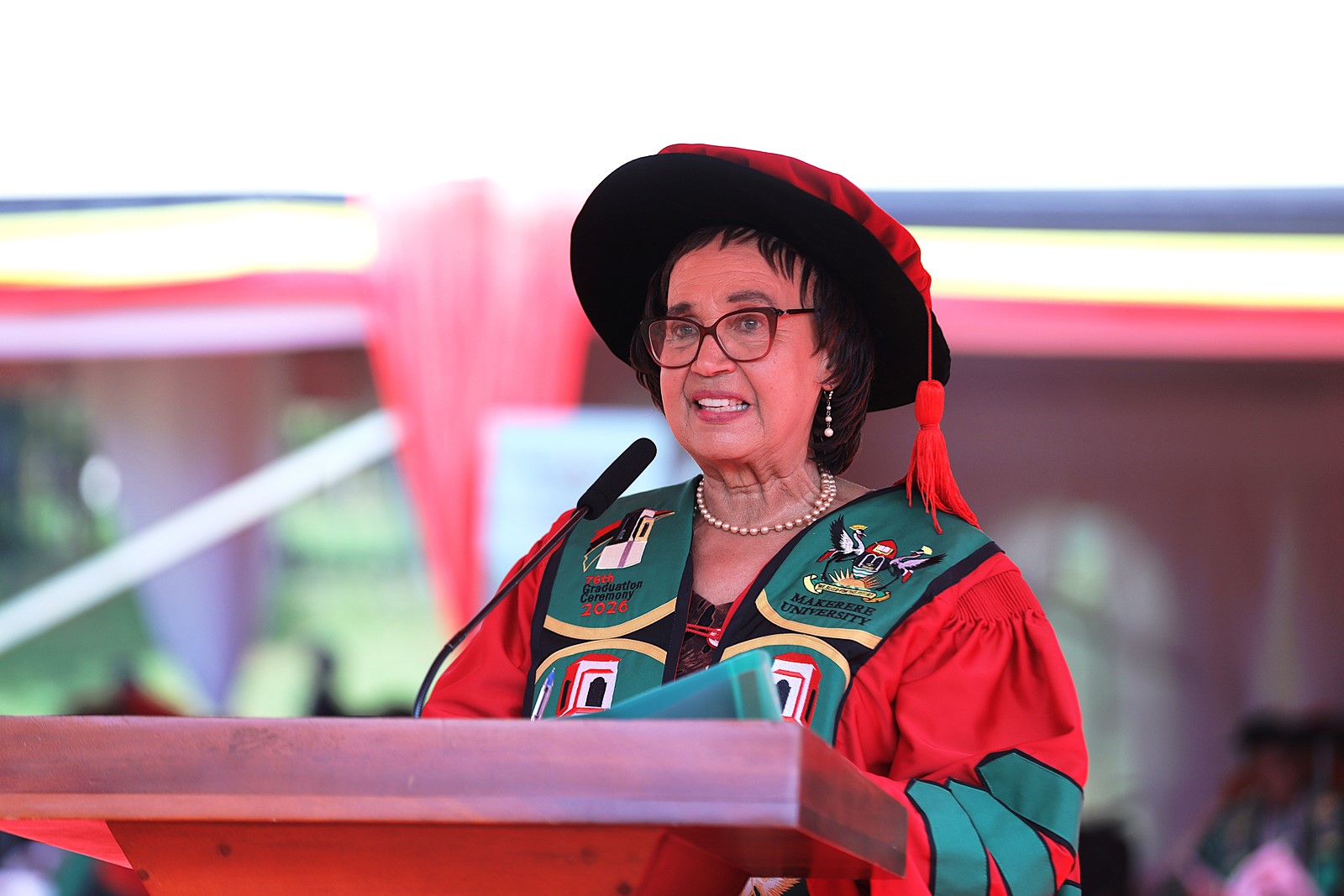
Remarks by the Chancellor
Makerere University Chancellor, Hon. Dr. Crispus Kiyonga congratulated the graduands on their achievement and commended the staff, parents, and partners for their invaluable support. He expressed gratitude to the Government for its steadfast commitment to advancing research through the annual UGX30 billion allocation to the Makerere University Research and Innovations Fund.
He underscored the University’s contribution to Uganda’s Fourth National Development Plan (NDP IV) through advancements in science, technology, and innovation, and encouraged graduates to embrace entrepreneurship amidst an increasingly competitive job market. He further called for enhanced research funding, stronger private sector collaboration, and deeper community engagement to accelerate national development.
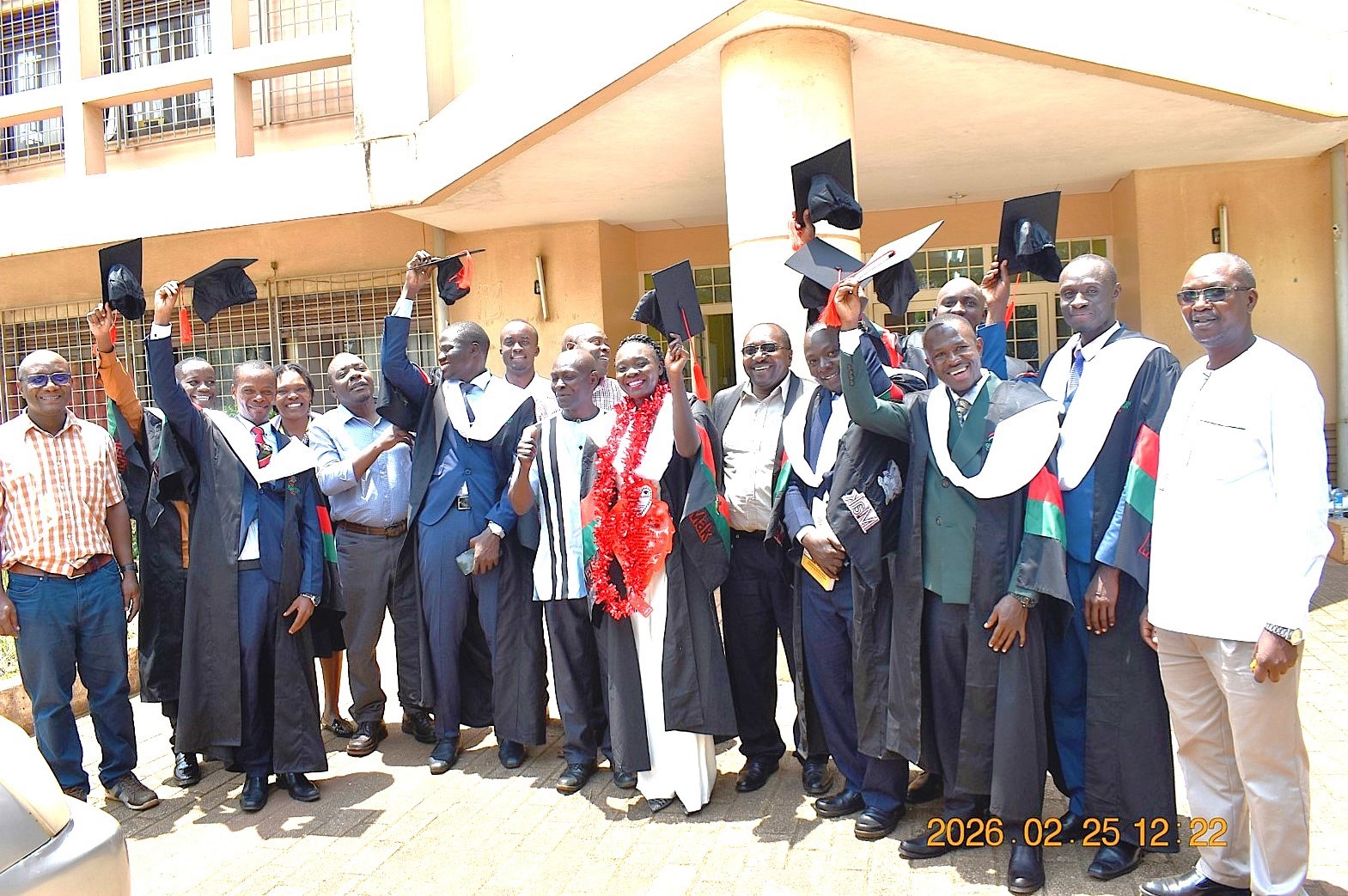
The Minister of Education and Sports
In her remarks, the Minister of Education and Sports, Hon. Janet Kataaha Museveni, represented by the Minister of State for Primary Education, Hon. Dr. Joyce Moriku Kaducu commended Makerere University for its pivotal role in driving national development. She highlighted the University’s contribution to knowledge generation and societal transformation. “The impressive number of PhD graduates this time round is testimony to the robust research output and academic excellence.” The Minister emphasized the importance of maintaining and enhancing academic standards, urging the University Administration to rigorously implement and uphold quality assurance measures that guarantee continued excellence of its programmes and global competitiveness of its graduates.
Implementing the Competence-based Education and Training
The Minister reiterated a key directive for all institutions of higher learning to prepare for the full implementation of Competence-Based Education and Training by July 2027. “This reform represents more than a policy shift. It signals a fundamental transformation in how graduates are prepared, with greater emphasis on practical skills, innovation, and problem-solving.” She urged the Vice Chancellor and his team to lead in curriculum reform, staff development, and infrastructure enhancement to ensure the successful rollout of competence-based education.
The Minister further urged the university management to ensure that all satellite campuses are fully accredited and that their programmes meet the same standards and relevance as those offered at the main campus.
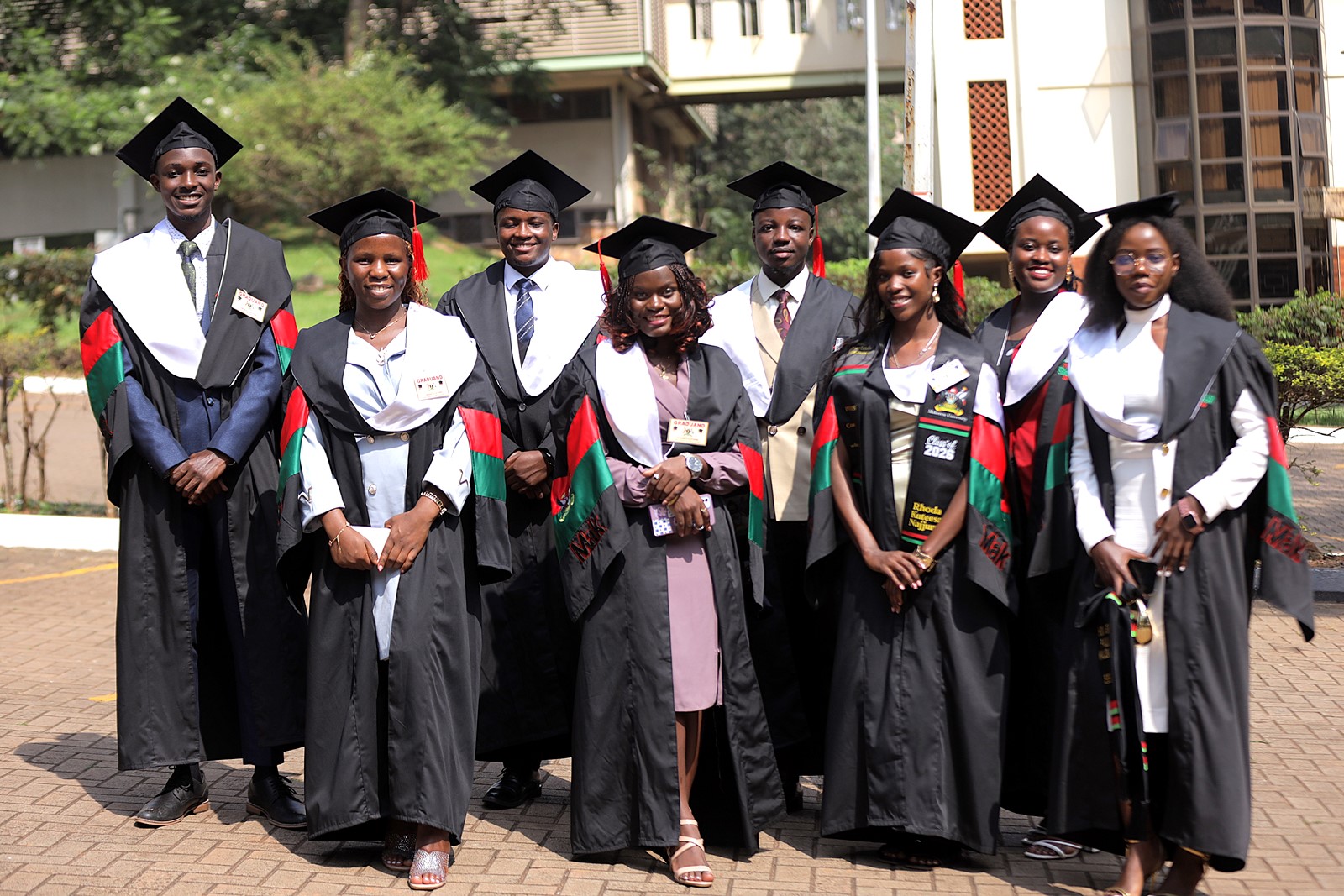
Commencement Lecture by Dr. Maggie Kigozi
At the ceremony, distinguished alumnus, and Chair of the Makerere University Endowment Fund, Dr. Maggie Kigozi delivered a compelling commencement lecture, reflecting on her journey since earning her first degree in 1976. She shared three guiding messages for the new alumni as they embark on their professional paths.
Dr. Kigozi emphasized that power comes with responsibility, urging graduates entering the health and life sciences to combine their expertise with ethical leadership and financial literacy to create sustainable, compassionate practices. She highlighted the global opportunities that a Makerere degree offers, explaining how her education empowered her to make meaningful contributions across Uganda, Kenya, and Zambia.
She also encouraged the graduates to view failure as a stepping stone to excellence, noting that mistakes are not setbacks, but lessons. She underscored the importance of balance, reminding graduates to manage their personal and professional responsibilities realistically.
Research Excellence Awards
During the graduation ceremony, Makerere University recognized the top researchers and innovators from the 10 Colleges. At CoNAS, Mr. Omara Timothy from the Department of Chemistry scooped the Overall Top Research and Early Career Researcher Awards, whereas Dr Godwin Anywar from the Department of Plant Sciences, Microbiology, and Biotechnology won the Mid-Career Researcher Award.
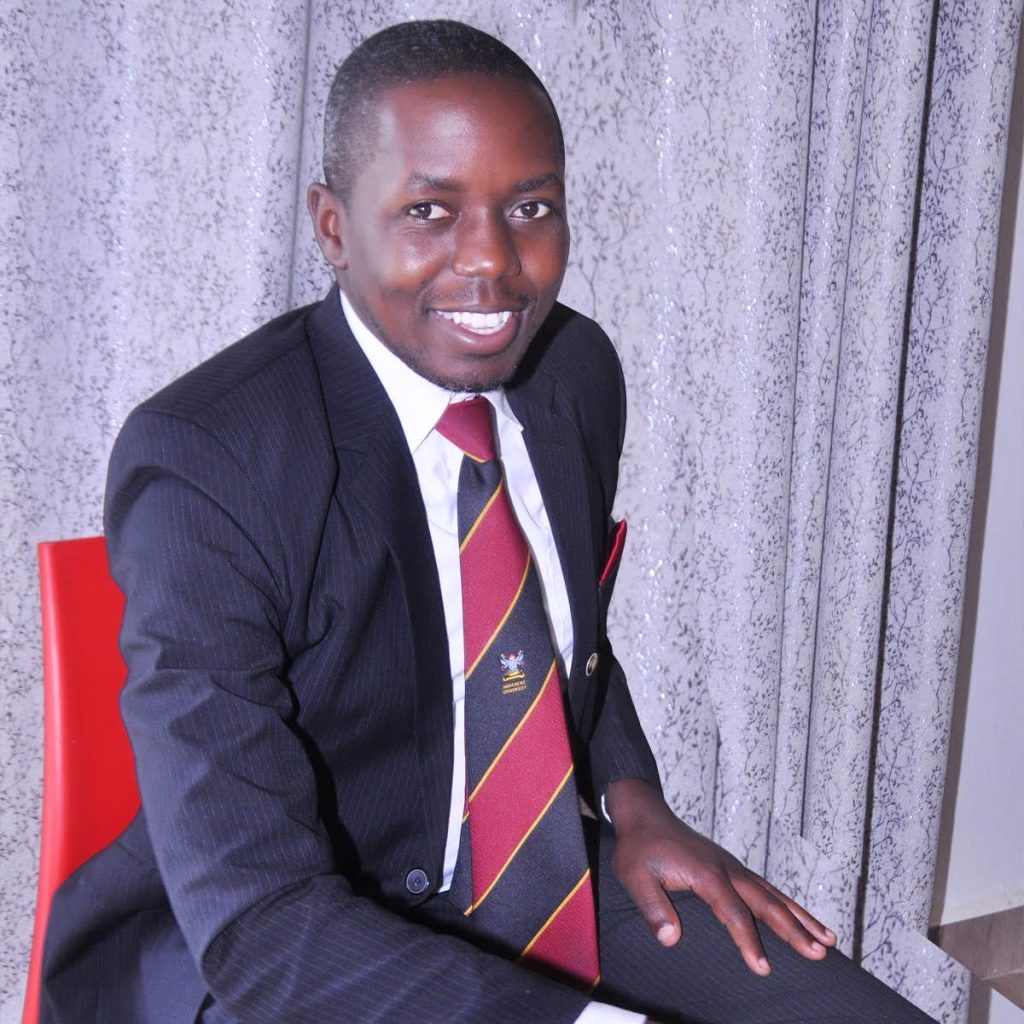
More about Simon Mungudit, the best performing male science student – https://cns.mak.ac.ug/simon-mungudit-maks-best-male-science-student-this-year-rising-star-in-petroleum-geoscience/
Natural Sciences
BOKU University Charts New Collaboration Strategies with Mak’s Department of Zoology, Entomology & Fisheries Sciences
Published
3 weeks agoon
February 12, 2026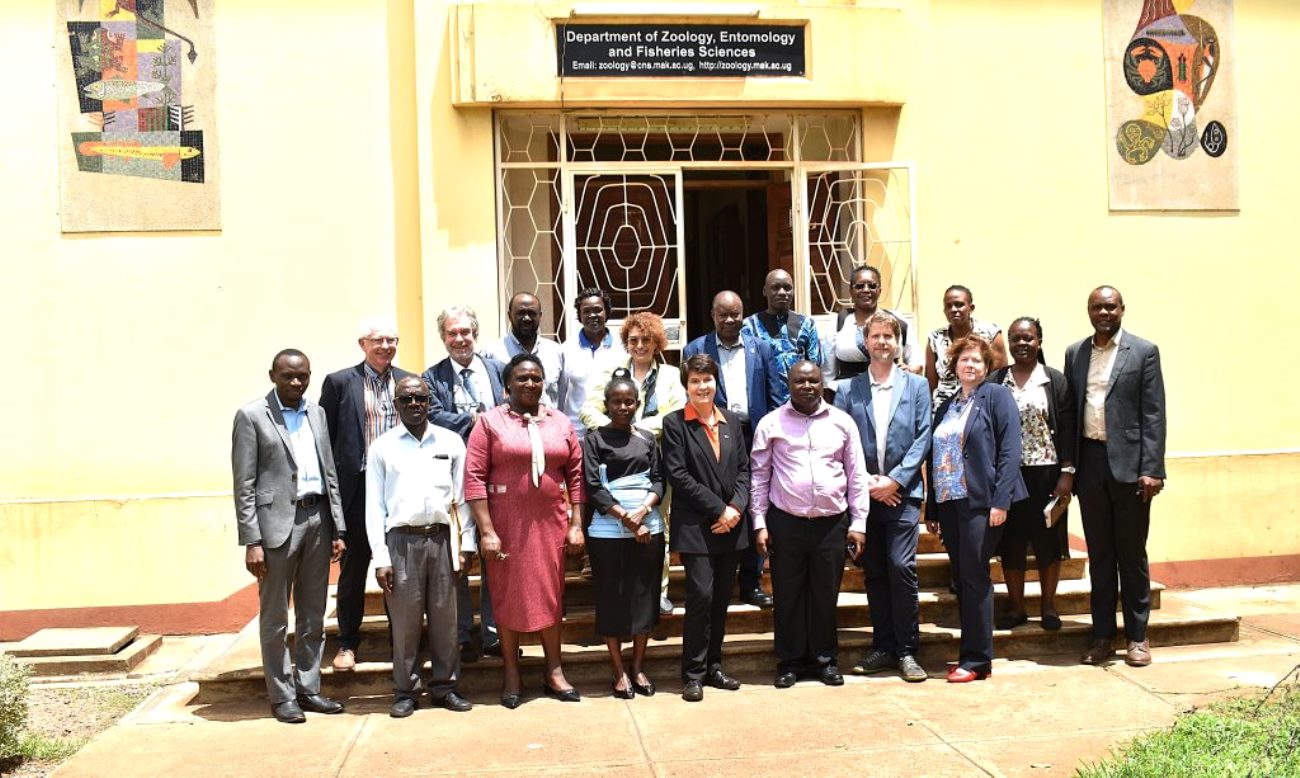
The Department of Zoology, Entomology and Fisheries Sciences at Makerere University on 11th February 2026 hosted a high-level delegation from the University of Natural Resources and Life Sciences, Vienna (BOKU), to discuss strategies for future collaboration in a partnership that has spanned five decades.
The meeting followed the BOKU team’s participation in the opening ceremony of the Promotion of Hybrid Renewable Energy Systems towards Electricity Access in Uganda project, an initiative designed to expand access to decentralized renewable energy solutions. The project, implemented under CEDAT, is funded by the Austrian Partnership Programme in Higher Education and Research for Development (APPEAR), a programme of the Austrian Development Cooperation administered by OeAD.
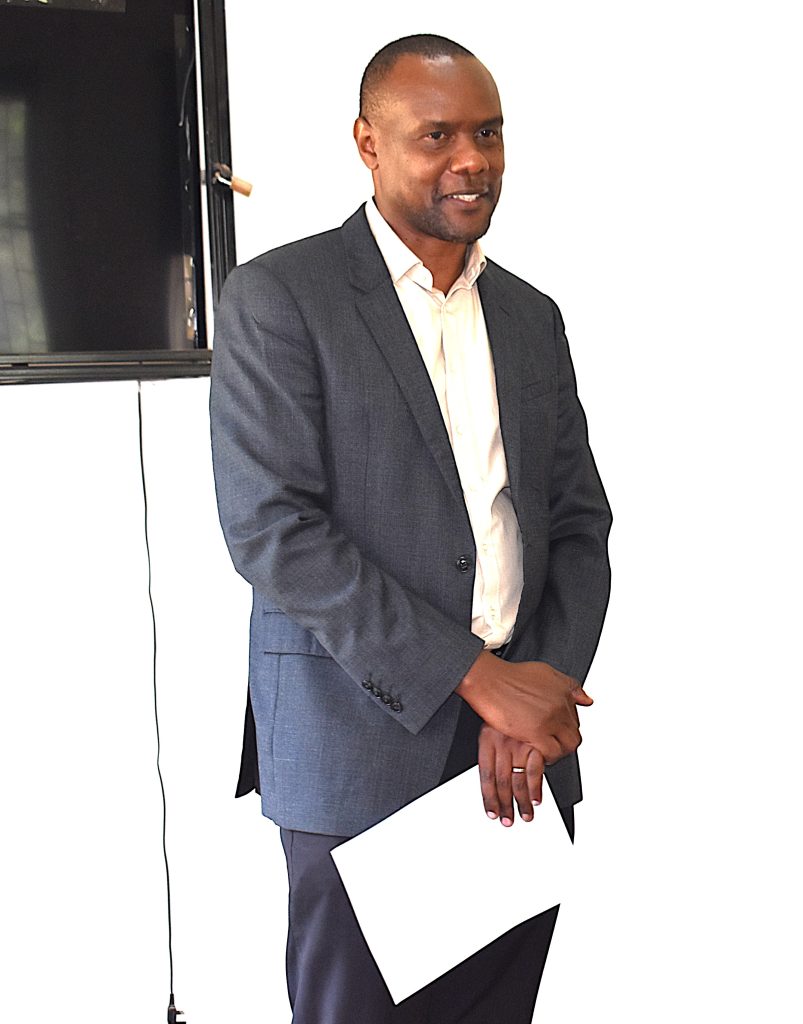
Discussions at the Department of Zoology, Entomology and Fisheries Sciences focused on deepening and broadening a historic collaboration that has shaped aquatic sciences, fisheries research, and environmental management in East Africa for half a century.
A Partnership Rooted in Limnology
The collaboration between Makerere University and BOKU traces its origins to 1975 with the establishment of the International Post-Graduate Course in Limnology (IPGL) by the late Heinz Löffler (1927-2006). The eight-month UNESCO-supported course, hosted in Lunz, Mondsee and Vienna, was designed to train scientists from developing countries in limnology – the study of inland waters.
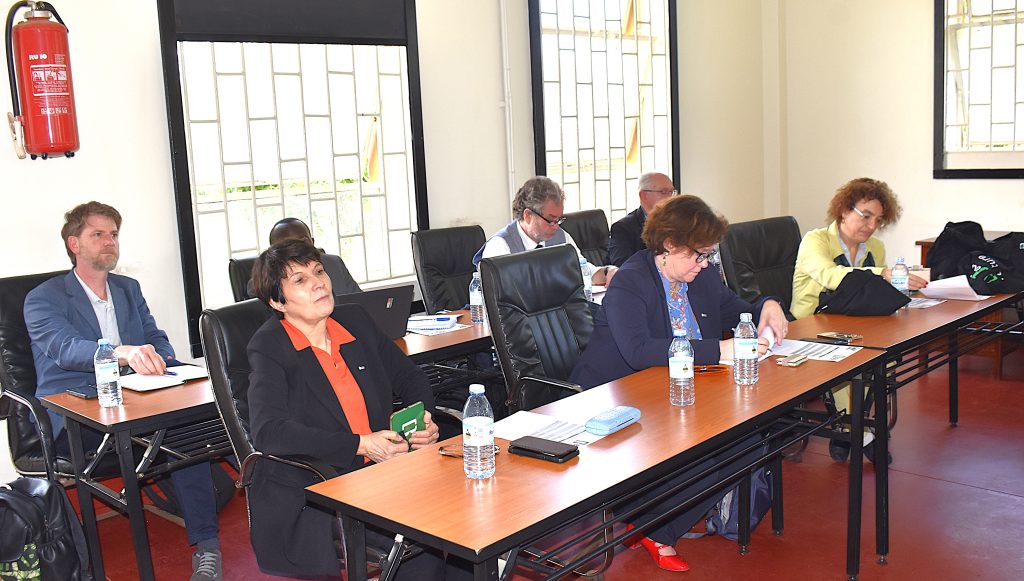
In 1976, Dr. Gwahaba James Joshua of Makerere’s Department of Zoology, Entomology and Fisheries Sciences became the first beneficiary from the university. Two years later, Boniface Makanga attended the UNESCO course and went on to initiate a Marine Practical Course to the Indian Ocean in 1993. That programme has since grown into over 30 years of annual field activity in Mombasa, benefiting undergraduate and master’s students and strengthening hands-on marine science training at Makerere.
Over time, IPGL evolved into a vibrant International Joint Degree Master’s Programme in Limnology and Wetland Management. The programme has built capacity for 123 aquatic professionals – 56 female and 67 male, including 20 from Makerere University. Notably, 11 dedicated limnologists are currently based within the Department of Zoology, Entomology and Fisheries Sciences, a testament to sustained capacity development.
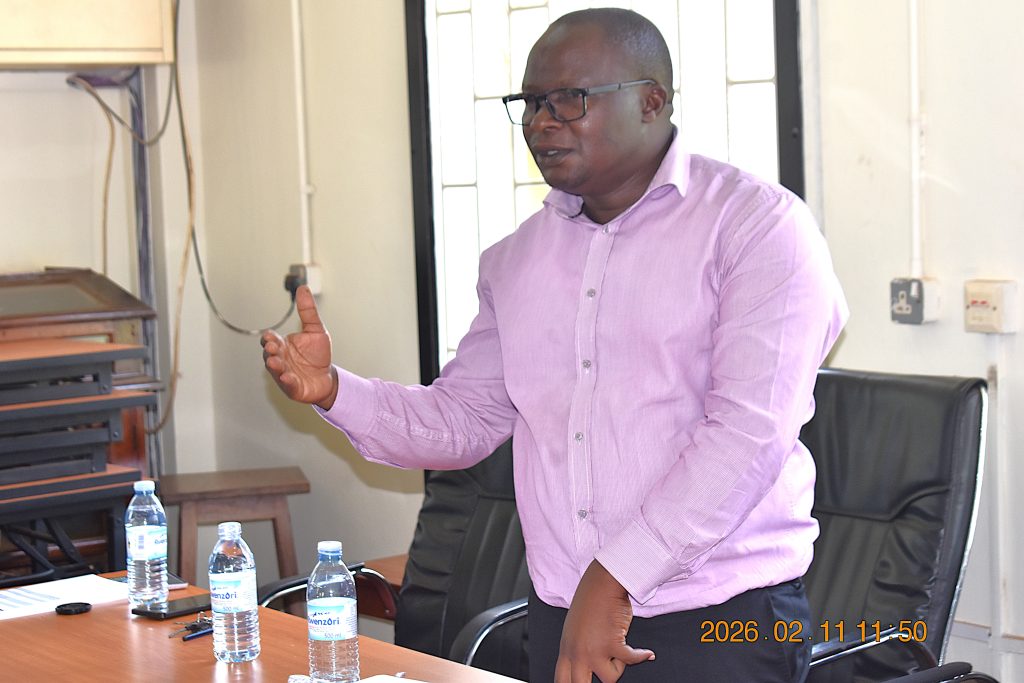
Expanding into Fisheries, Aquaculture and Regional Networks
The Mak-BOKU collaboration progressively expanded beyond limnology into fisheries, aquaculture, and broader freshwater ecosystem management.
Among the key initiatives was STRECAFISH (2015-2018), which focused on strengthening regional capacity in fisheries and aquaculture research and training to improve food security and livelihoods in Eastern Africa. The programme adopted a modular approach, trained 28 MSc students, supported five full PhDs and 11 MSc research projects, and facilitated 14 staff exchanges.
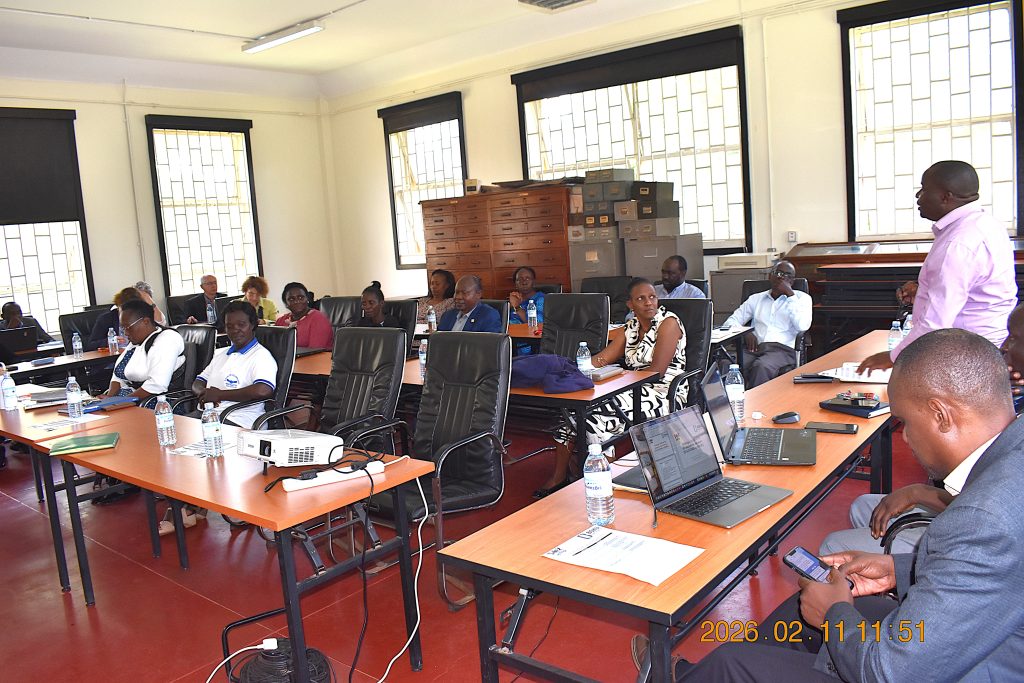
This momentum continued under COTRA (Collaborative Training in Fisheries and Aquaculture in East, Central and Southern Africa) from 2017 to 2023. COTRA enhanced staff and student mobility, supporting 24 master’s students (six credit-seeking and 18 degree-seeking), 12 doctoral candidates (four credit-seeking and eight degree-seeking), and 10 faculty and administrative staff. The initiative emphasized fit-for-purpose PhD training in aquaculture and fisheries to address food security challenges in Sub-Saharan Africa under the ACP-EU Cooperation Programme in Higher Education (EDULINK II), in partnership with institutions such as Lilongwe University of Agriculture and Natural Resources.
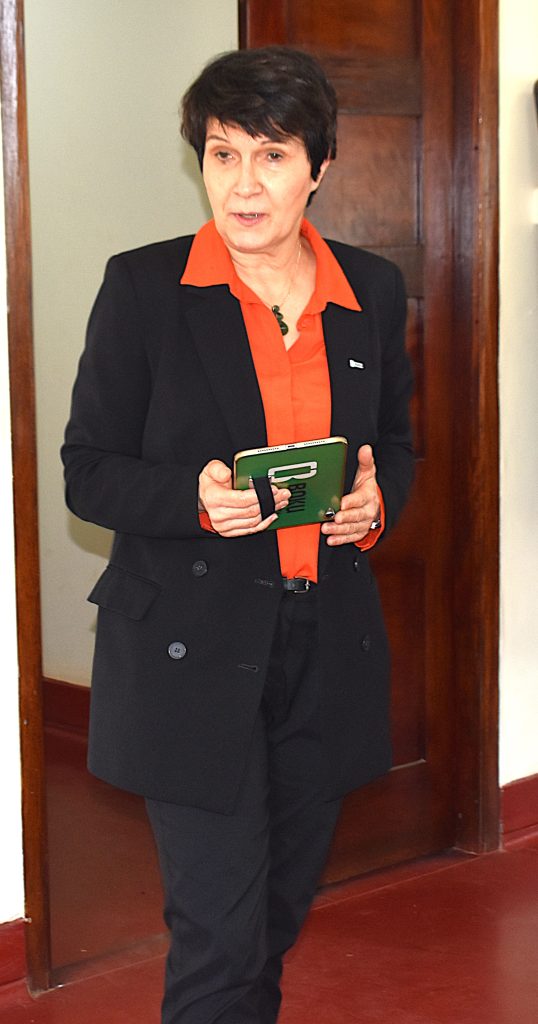
Ongoing collaborations include the Erasmus+ KA1 Learning Mobility of Individuals programme (2021-2027), which connects BOKU and Makerere with Egerton University, Kyambogo University, Addis Ababa University, Bahir Dar University and others. Additional joint initiatives include:
FreshNet: A higher education and research network for sustainable management of freshwater ecosystems in Eastern Africa, involving BOKU, Egerton University, Addis Ababa University, Bahir Dar University, EIAR and IHE Delft.
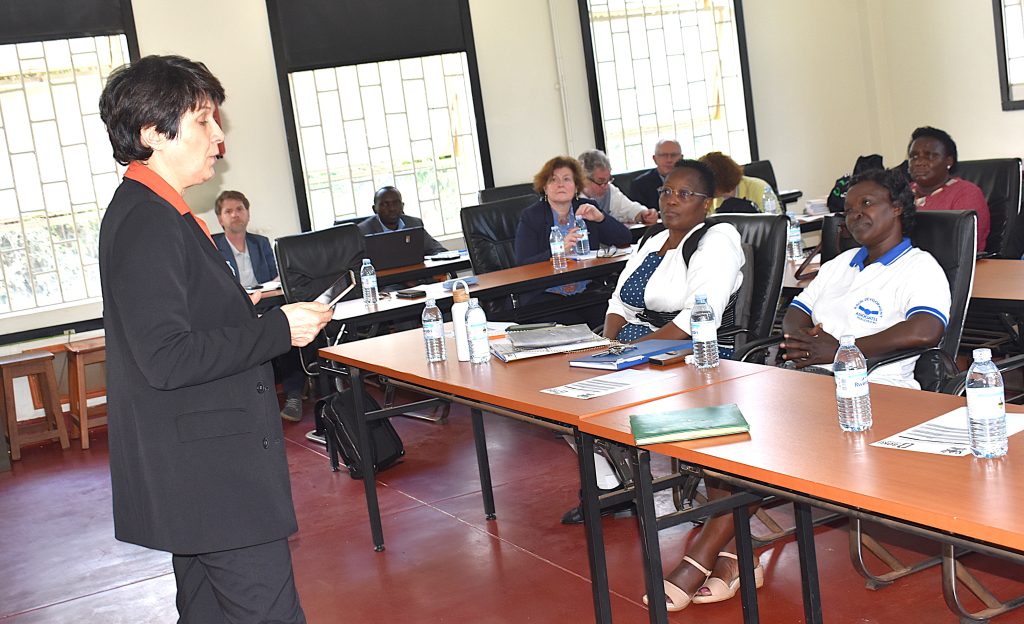
SWAQ-Uganda (2021-2026): Sustainable water quality management supporting Uganda’s development ambitions, implemented with IIASA, BOKU and Uganda’s Ministry of Water and Environment.
BIOGOLD (2024–2027): A project on biosorption for sustainable small-scale gold mining in Uganda, involving Kyambogo University, Makerere University, Gulu University, the University for Continuing Education and the University of Pretoria.
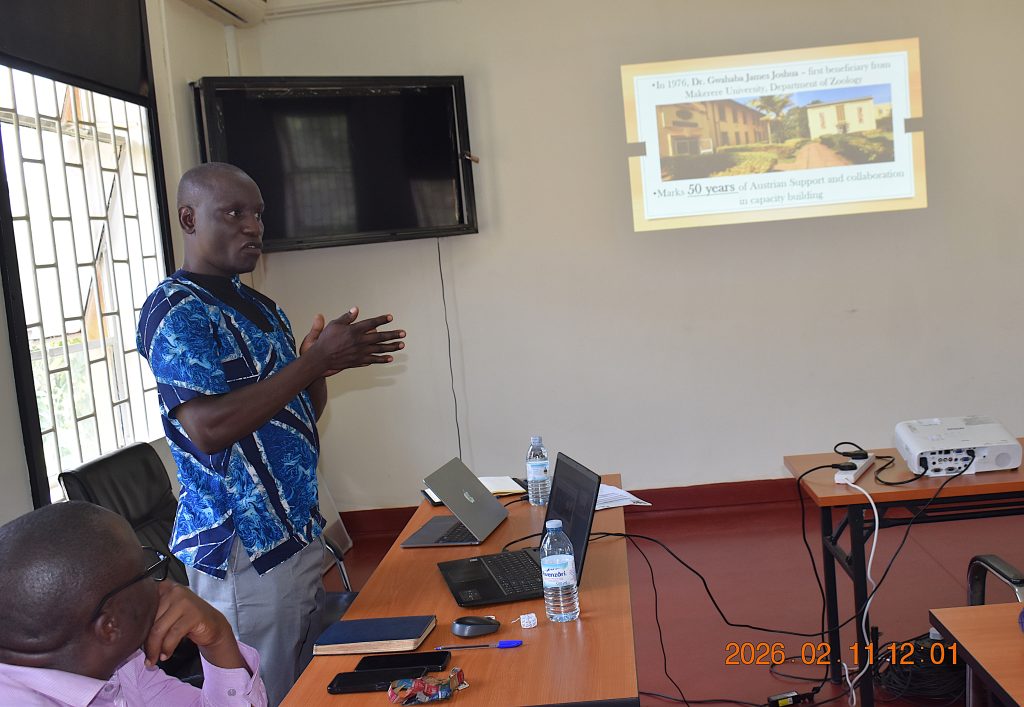
Collectively, these initiatives underscore a 50-year-old partnership that has built critical human resources at MSc and PhD levels in aquatic ecosystem management, conservation and utilization. The collaboration has also facilitated acquisition of essential research equipment, strengthened administrative capacity in project management, and nurtured a culture of knowledge sharing and innovation.
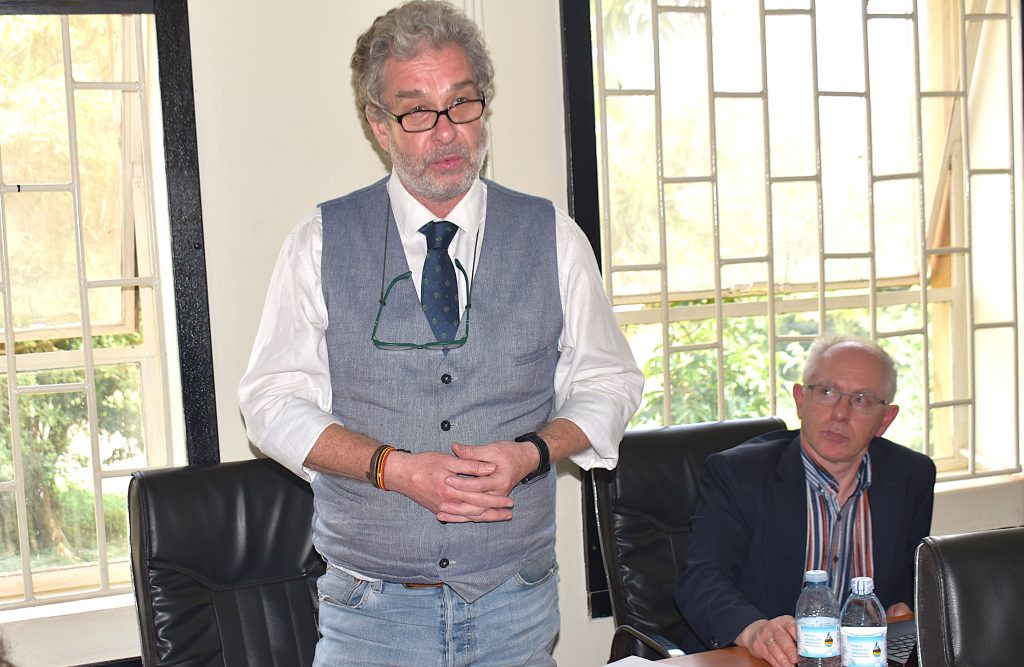
Meeting with the BOKU delegation
The BOKU delegation was led by the Rector, Prof. Eva Schulev-Steindl, a specialist in environmental law, and Vice Rector Assoc. Prof. Doris Damyanovic, an expert in landscape planning. They were accompanied by:
- Mag. Gerold Winkler, Coordinator of the Applied Limnology / Limnology and Wetland Master’s programme;
- Dr. Mathew Herrnegger, BOKU’s Africa Cooperation Country Coordinator and hydrology specialist; and
- Dr. Andreas Melcher, Africa-Uninet Coordinator from BOKU’s Institute for Development Research.
During the discussions with departmental staff, Dr. Akoll presented a detailed account of the partnership’s evolution and achievements, emphasizing its transformative impact on regional training and research capacity.
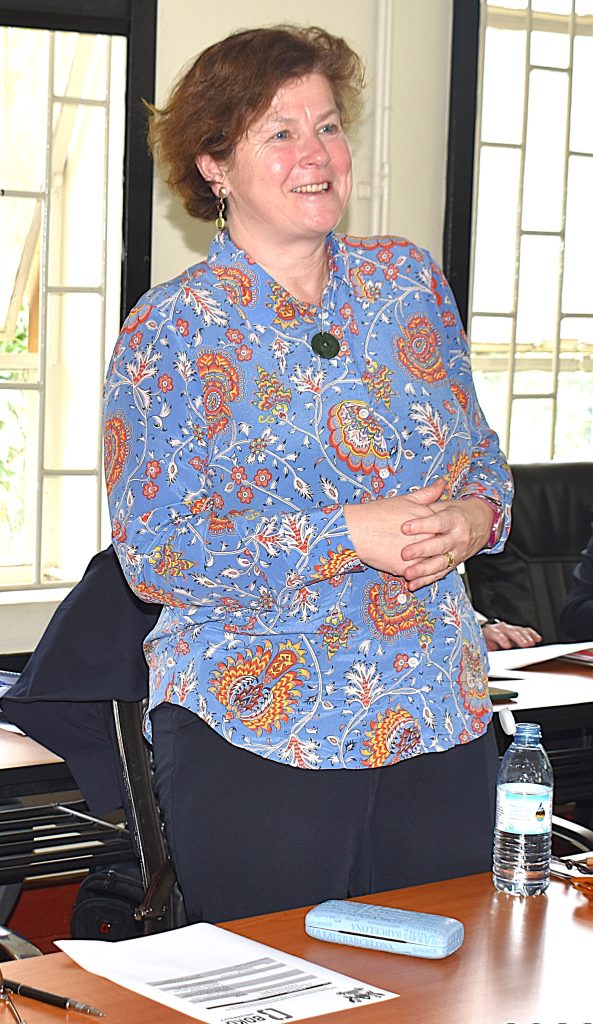
Charting the Next Chapter
As the partnership enters its sixth decade, both institutions are keen to expand into new frontiers. Key areas identified for future collaboration include:
- Enhanced staff and student exchanges;
- Joint research projects and co-publications;
- Introduction of short courses at the Makerere University Biological Field Station, Kibale beyond wildlife studies;
- Research on climate change and its effects on marine and freshwater resources;
- Advancement of basic biological research; and
- Strengthening fisheries research and innovation.
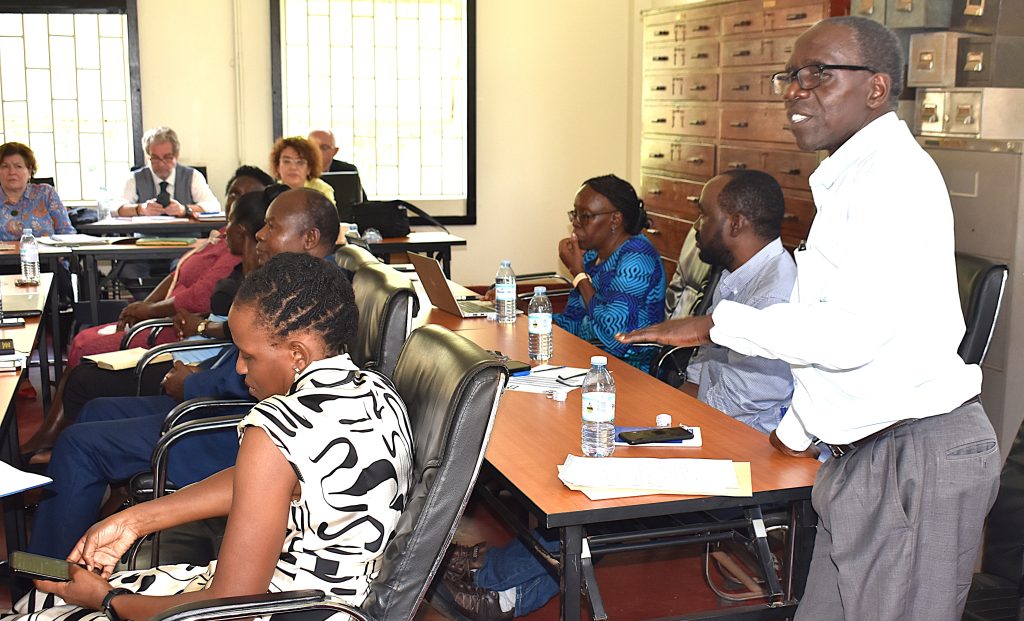
In his remarks, the Head of the Department of Zoology, Entomology and Fisheries Sciences, Dr. Godfrey Kawooya expressed gratitude for the enduring partnership, noting that it has significantly strengthened regional training capacity and supported the education of numerous Makerere staff and students. He added that the collaboration reinforces Makerere’s standing as one of the most collaborative universities globally and aligns closely with its research agenda.
Rector Schulev-Steindl reaffirmed BOKU’s commitment to advancing the longstanding relationship, describing it as a model of North-South academic cooperation built on mutual respect, shared knowledge and tangible impact.
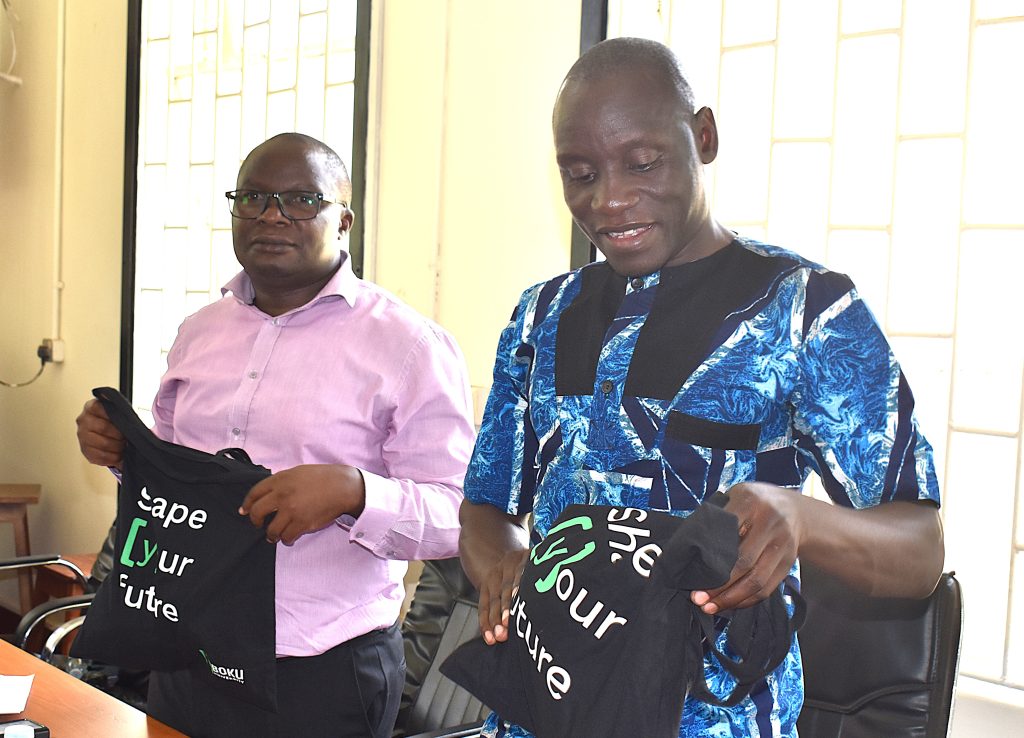
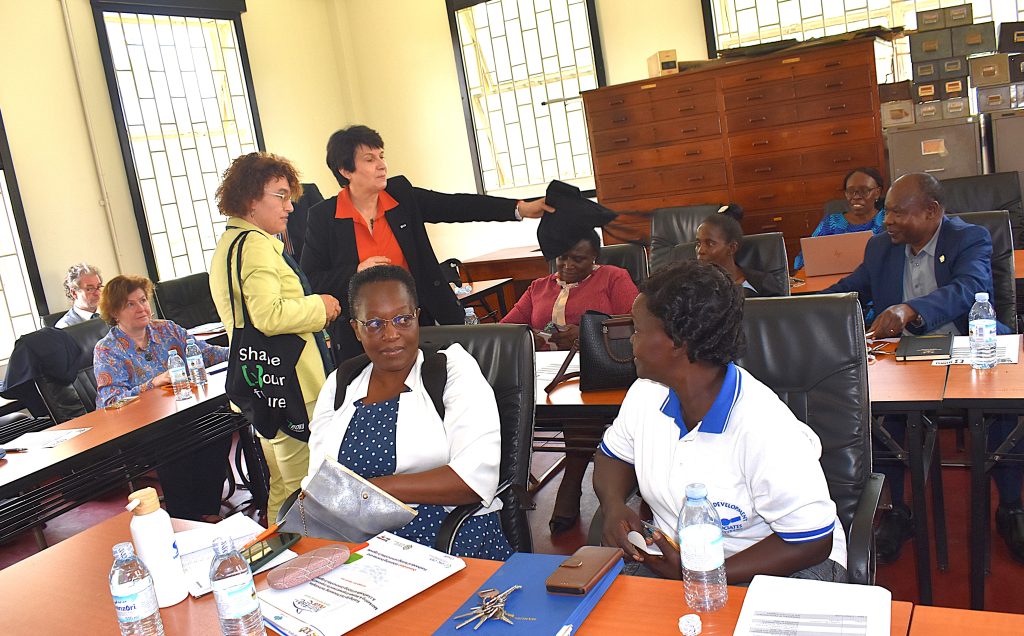
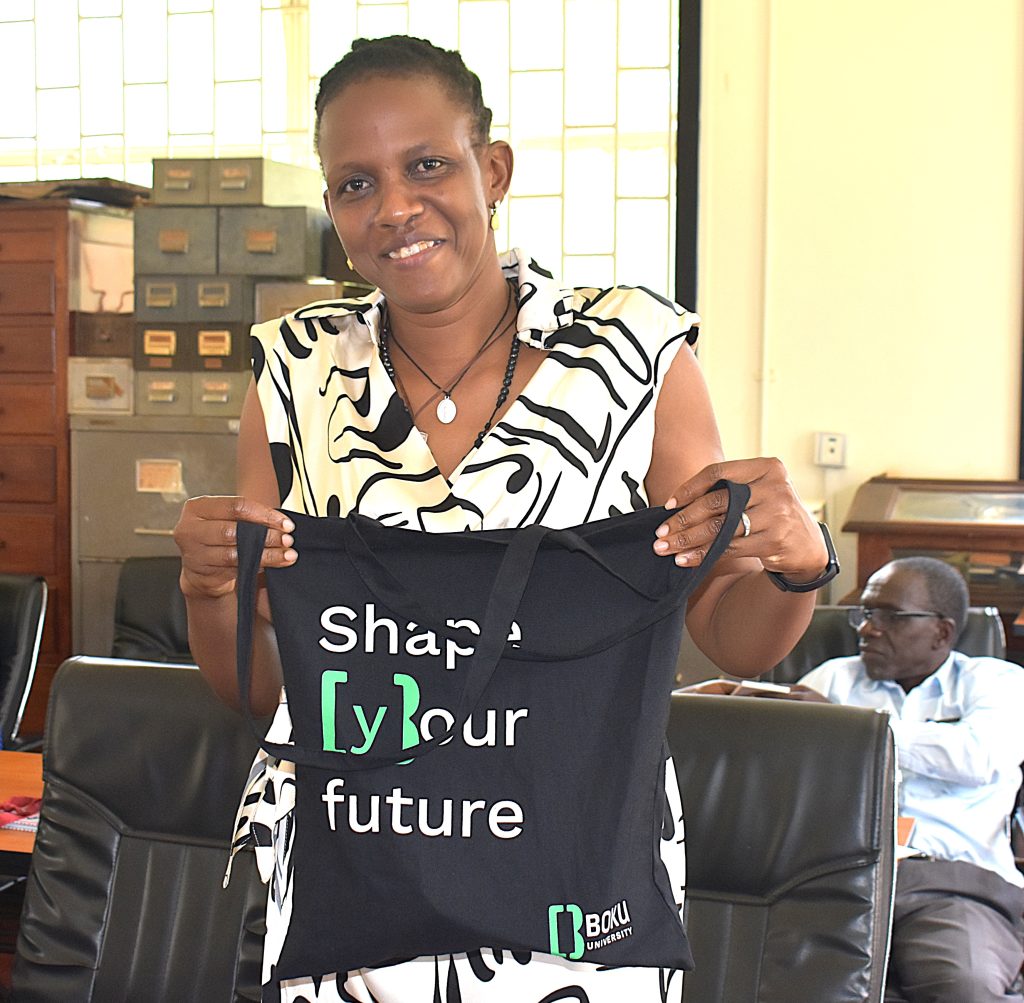
Event pictorial: https://drive.google.com/drive/folders/1HkCCZf_TCPV0V7_ZR2PSVEw1zrEGhZeJ?usp=sharing
Trending
-

 General10 hours ago
General10 hours agoCall for Applications: Diploma Holders under Government Sponsorship 2026/2027
-

 General9 hours ago
General9 hours agoAdvert: Admissions for Diploma/Degree Holders under Private Sponsorship 2026/27
-

 Humanities & Social Sciences1 week ago
Humanities & Social Sciences1 week agoMeet Najjuka Whitney, The Girl Who Missed Law and Found Her Voice
-

 General1 week ago
General1 week ago76th Graduation Highlights
-

 Agriculture & Environment2 weeks ago
Agriculture & Environment2 weeks agoUganda Martyrs Namugongo Students Turn Organic Waste into Soap in an Innovative School Project on Sustainable Waste Management
